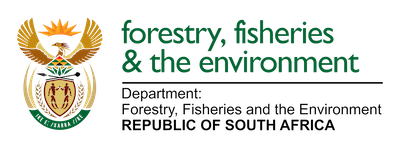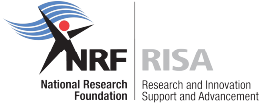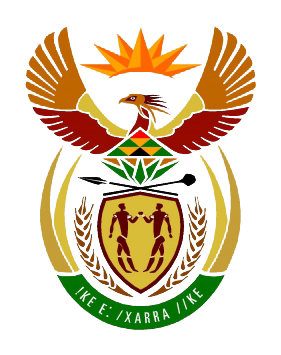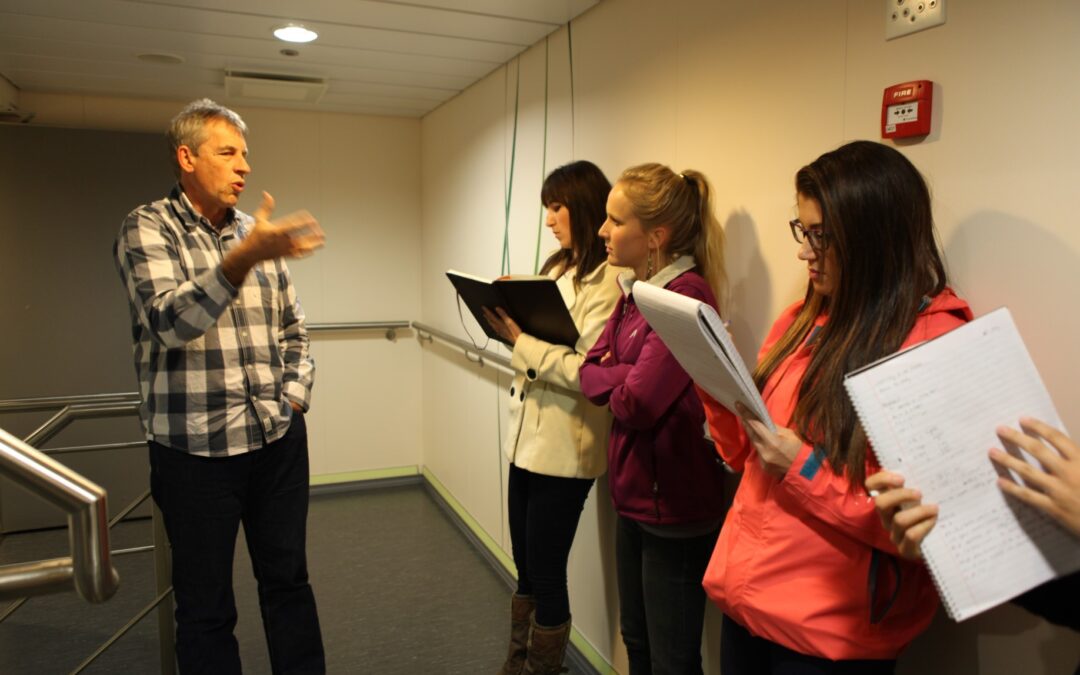
by Ria Olivier | Jul 15, 2020 | Discover, Research, SA Agulhas II, SANAP, Science, SEAmester, Southern Ocean, STEM, Women in Science



 Isabelle as a child always wanted to be an oceanographer. “When I was 13 my father sent me off for 6 months on a Tall Ship to sail around Africa. And so, having grown up on sailing ships and sailing the world at a very young age it seemed only natural to follow in my passion to build a career around the sea.
Isabelle as a child always wanted to be an oceanographer. “When I was 13 my father sent me off for 6 months on a Tall Ship to sail around Africa. And so, having grown up on sailing ships and sailing the world at a very young age it seemed only natural to follow in my passion to build a career around the sea.


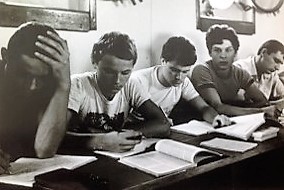 I first studied at Plymouth University in the UK, where I completed a BSc in Ocean Sciences in 1992. I came to South Africa in 1993 and under the mentorship of Professor Lutjeharms in the Oceanography Department at UCT I started to turn this passion into a sea-going academic career.
I first studied at Plymouth University in the UK, where I completed a BSc in Ocean Sciences in 1992. I came to South Africa in 1993 and under the mentorship of Professor Lutjeharms in the Oceanography Department at UCT I started to turn this passion into a sea-going academic career.


 One of my first jobs at UCT was to gain seagoing experience in working with all ship-based equipment. I loved being at sea and felt that after my many experiences on both national and international research vessels that I would be good at teaching practical oceanography. And so began a long period of sea-going adventures between 1996 and 2016 in which UCT Honours students were taken to sea onboard the old SA Agulhas I and from 2012 the new SA Agulhas II. The training was always part of the 5 week Prince Edward Island relief voyage and in those days students had to work the winches, drive the CTD software, work up the data for mini-projects!
One of my first jobs at UCT was to gain seagoing experience in working with all ship-based equipment. I loved being at sea and felt that after my many experiences on both national and international research vessels that I would be good at teaching practical oceanography. And so began a long period of sea-going adventures between 1996 and 2016 in which UCT Honours students were taken to sea onboard the old SA Agulhas I and from 2012 the new SA Agulhas II. The training was always part of the 5 week Prince Edward Island relief voyage and in those days students had to work the winches, drive the CTD software, work up the data for mini-projects!

 Isabelle’s Working Life: “I was employed as a lecturer at UCT in 2006 and have worked hard to build a career both nationally and internationally in observational oceanography. My passion and love for the sea can be seen in the many opportunities that I create for students both at UCT, and as can be seen from the SEAmester Floating University across the entire country. I was the first female PhD graduate in Oceanography at UCT in 2000, I am the only female Full Professor in the Oceanography Department and the first female Head of Department in 2016. “
Isabelle’s Working Life: “I was employed as a lecturer at UCT in 2006 and have worked hard to build a career both nationally and internationally in observational oceanography. My passion and love for the sea can be seen in the many opportunities that I create for students both at UCT, and as can be seen from the SEAmester Floating University across the entire country. I was the first female PhD graduate in Oceanography at UCT in 2000, I am the only female Full Professor in the Oceanography Department and the first female Head of Department in 2016. “


 What drives me:” I love teaching students. Taking a student to sea and watching them learn and seeing their eyes light up when they first board the SA Agulhas II is extremely rewarding. Many of my former students have returned to sea either as senior researchers leading their own cohort of students, or they have built their career in marine management or moved into the academic field. It is so rewarding see young inexperienced students join a cruise and leave imbued with a new confidence and a passion for their discipline.
What drives me:” I love teaching students. Taking a student to sea and watching them learn and seeing their eyes light up when they first board the SA Agulhas II is extremely rewarding. Many of my former students have returned to sea either as senior researchers leading their own cohort of students, or they have built their career in marine management or moved into the academic field. It is so rewarding see young inexperienced students join a cruise and leave imbued with a new confidence and a passion for their discipline.
 “I am proud of the SEAmester programme and how we have been able to develop linkages with traditionally non marine universities both through their students joining as SEAmester students or their own Lecturers joining the academic programme. The state-of-the-art research vessel, SA Agulhas II, provides such an incredible teaching and research platform for this programme; its size, comfort and shipboard facilities allow groups of 46 students and 30 lecturers to productively interact over a period of 10 days as can the photo of Prof Gammon teaching students in the ship’s stairwell shows so well!.”
“I am proud of the SEAmester programme and how we have been able to develop linkages with traditionally non marine universities both through their students joining as SEAmester students or their own Lecturers joining the academic programme. The state-of-the-art research vessel, SA Agulhas II, provides such an incredible teaching and research platform for this programme; its size, comfort and shipboard facilities allow groups of 46 students and 30 lecturers to productively interact over a period of 10 days as can the photo of Prof Gammon teaching students in the ship’s stairwell shows so well!.”
 My advice to the young generation: “Four words – always take the initiative! In the UK the only sea-going opportunity I had was to work on the River Tamar outside of Plymouth! In South Africa our students go to Antarctica! But it takes you to make that difference. We have so many wonderful opportunities in South Africa and access to such incredible marine programmes and platforms but the sparkplug to get started must come from you. All academics get frustrated by students not willing to engage with their surroundings and
My advice to the young generation: “Four words – always take the initiative! In the UK the only sea-going opportunity I had was to work on the River Tamar outside of Plymouth! In South Africa our students go to Antarctica! But it takes you to make that difference. We have so many wonderful opportunities in South Africa and access to such incredible marine programmes and platforms but the sparkplug to get started must come from you. All academics get frustrated by students not willing to engage with their surroundings and 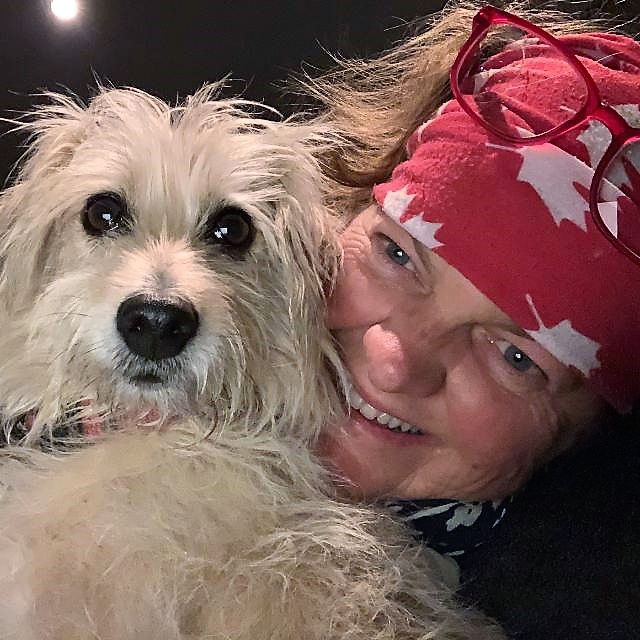 not even realise the enormous privilege it is to be on a research vessel such as the SA Agulhas II. You don’t have to be the brightest student in the class but by staying engaged, enthusiastic, interactive and dedicated to your studies you will always go much further in life. Opportunities are endless but it takes you to grab it!”
not even realise the enormous privilege it is to be on a research vessel such as the SA Agulhas II. You don’t have to be the brightest student in the class but by staying engaged, enthusiastic, interactive and dedicated to your studies you will always go much further in life. Opportunities are endless but it takes you to grab it!”
Text and Images supplied by Isabbelle Ansorge.
Visit SANAP website on Isabelle Ansorge’s current research projects within the program. Also see Sunday Science on SEAmester
https://youtu.be/0LUpdr-masA
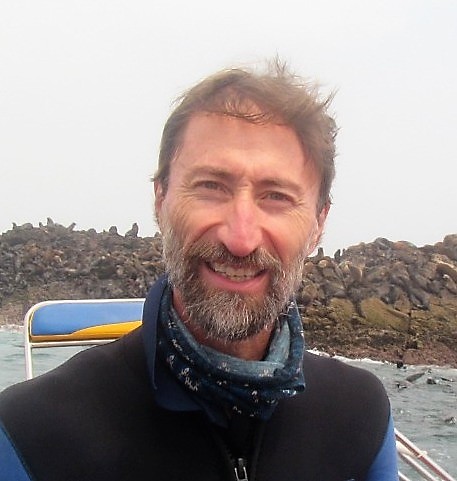
by Ria Olivier | Jul 13, 2020 | Research, SANAP, Science, SEAmester, sub-Antarctic, Take-Over Operations
 Family hikes and visits to game reserves instilled in me a keen interest in the natural world at an early age. This led to a BSc and BSc hons in Zoology at the University of the Witwatersrand. This was followed by the first of three year-long expeditions to Marion Island. While on Marion Island I worked for the Mammal Research Institute of the University of Pretoria, as part of the Marine Mammal Programme. Trips to Marion Island were followed by several summer seasons as a field biologist on Bouvet Island, a Norwegian possession in the Southern Ocean. I subsequently worked as a fisheries biologist in Namibia before returning to Pretoria to complete my MSc on the behavioural ecology of elephant seals.
Family hikes and visits to game reserves instilled in me a keen interest in the natural world at an early age. This led to a BSc and BSc hons in Zoology at the University of the Witwatersrand. This was followed by the first of three year-long expeditions to Marion Island. While on Marion Island I worked for the Mammal Research Institute of the University of Pretoria, as part of the Marine Mammal Programme. Trips to Marion Island were followed by several summer seasons as a field biologist on Bouvet Island, a Norwegian possession in the Southern Ocean. I subsequently worked as a fisheries biologist in Namibia before returning to Pretoria to complete my MSc on the behavioural ecology of elephant seals.
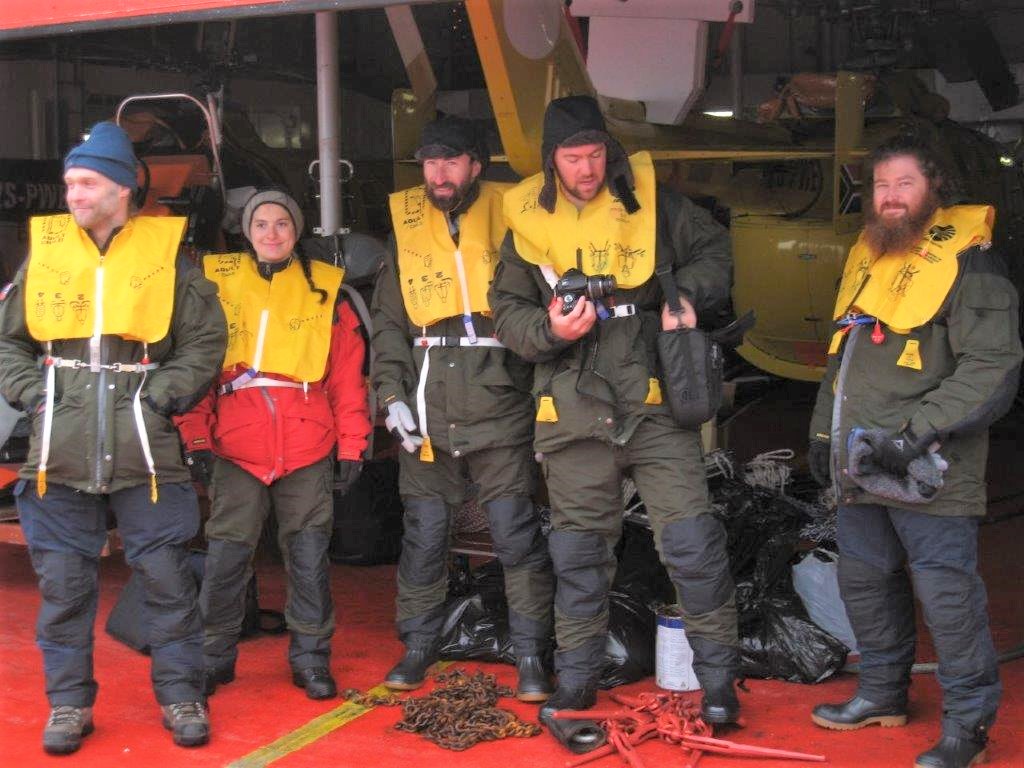
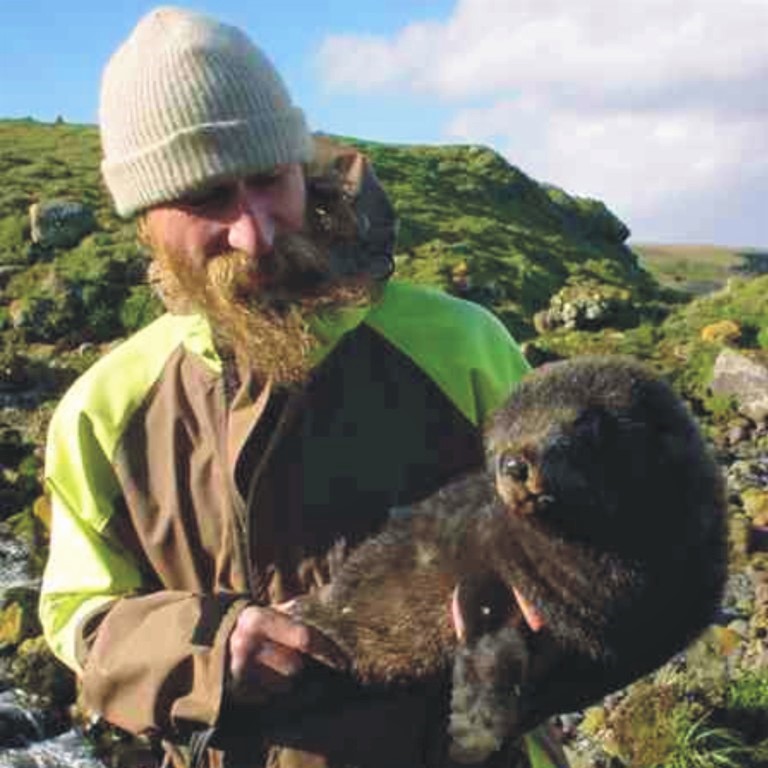
 Above (l-r) : Greg(middle) to leave for Bouvet; Greg on Marion Island; Greg on Bouvet Island
Above (l-r) : Greg(middle) to leave for Bouvet; Greg on Marion Island; Greg on Bouvet Island
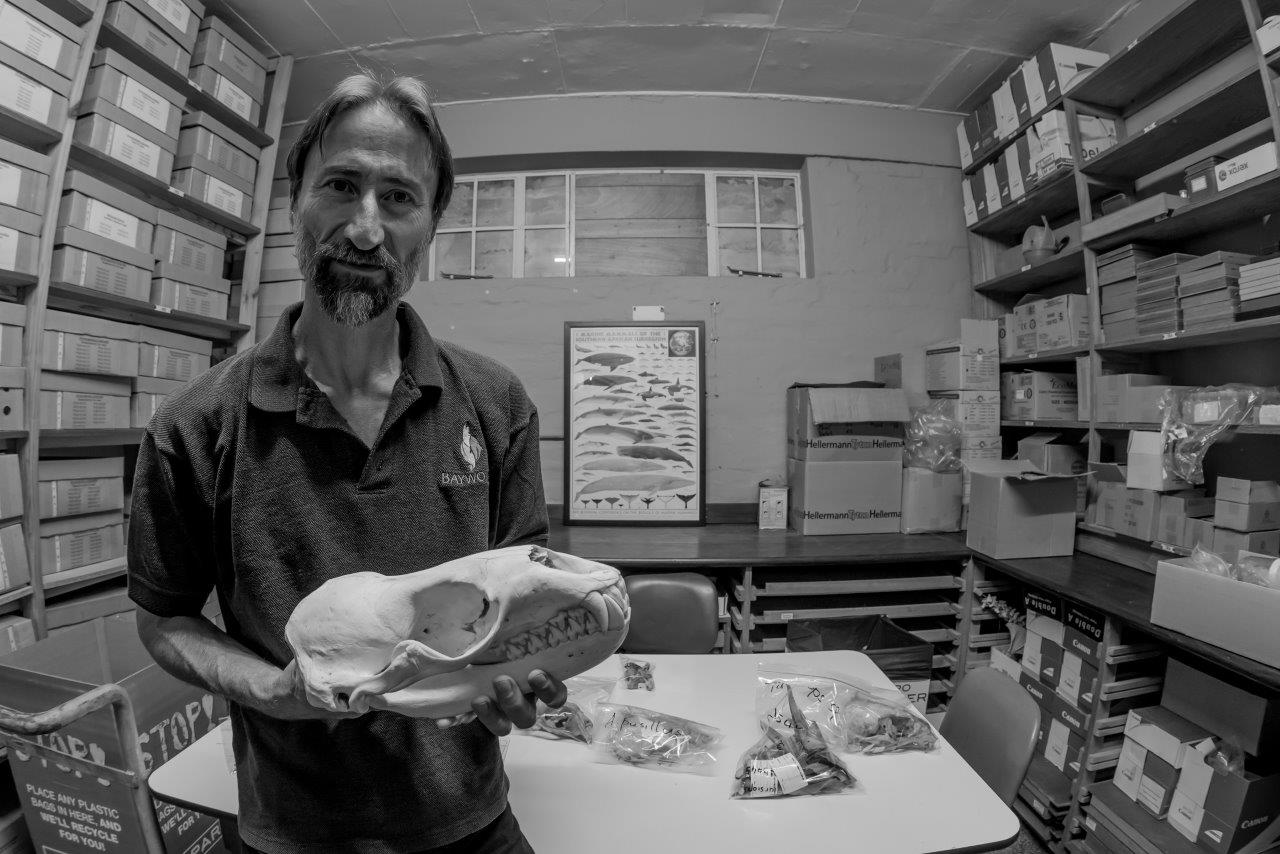 I took up my current employment in 2006 as marine mammal biologist at the Port Elizabeth Museum at Bayworld. While at the PEM, I completed a PhD, also on elephant seals. I am currently curator of the marine mammal collection at the PEM, and am thus responsible for the Southern Hemisphere’s largest marine mammal collection. This comprises over 6 000 specimens of more than 50 species. It continues to grow by some 30-40 specimens per year and is used by researchers from all over the world.
I took up my current employment in 2006 as marine mammal biologist at the Port Elizabeth Museum at Bayworld. While at the PEM, I completed a PhD, also on elephant seals. I am currently curator of the marine mammal collection at the PEM, and am thus responsible for the Southern Hemisphere’s largest marine mammal collection. This comprises over 6 000 specimens of more than 50 species. It continues to grow by some 30-40 specimens per year and is used by researchers from all over the world.
Why you love your career in science?
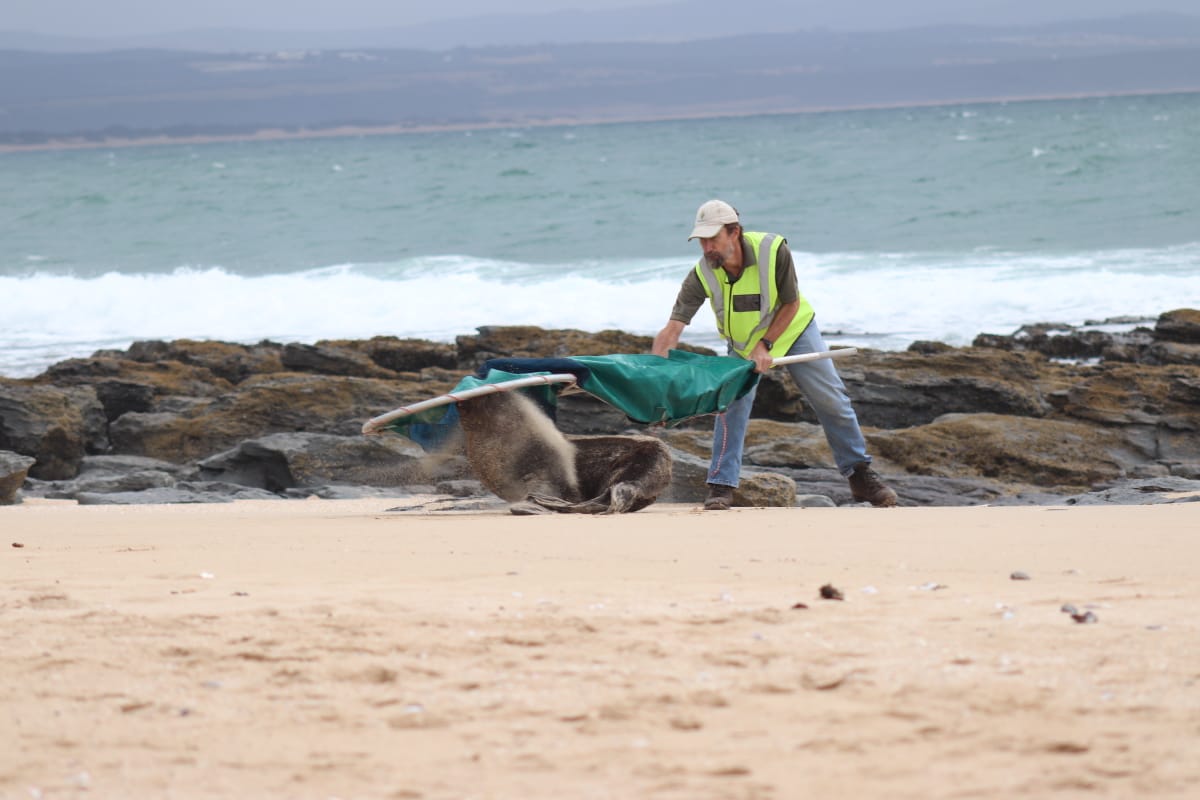
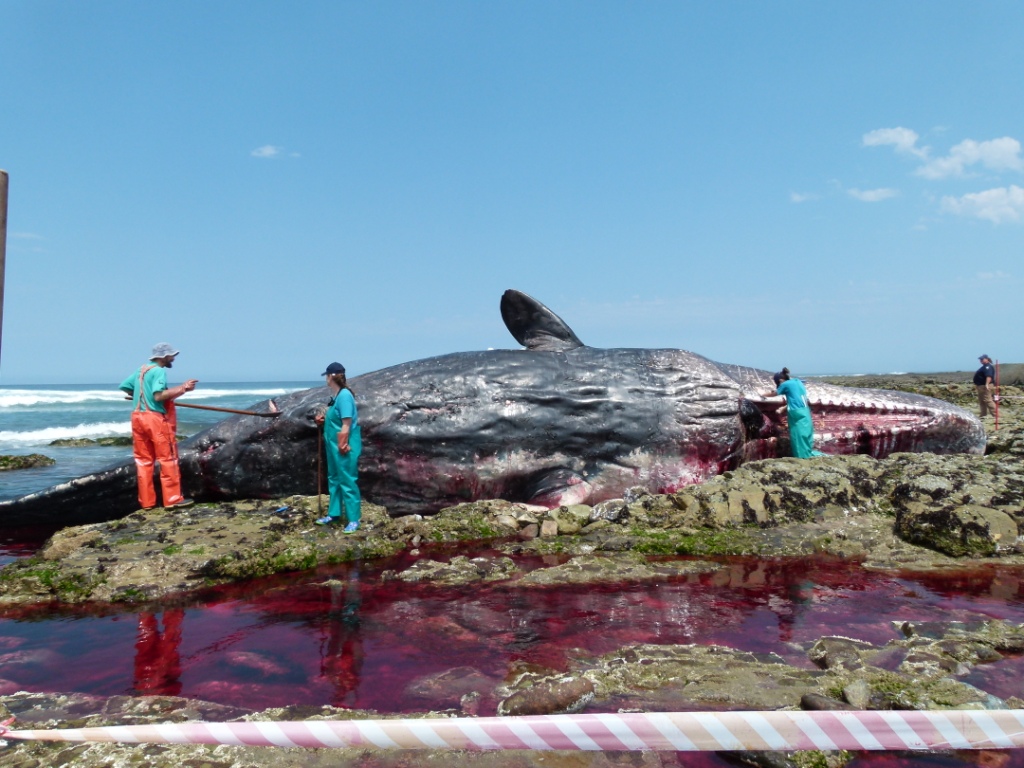
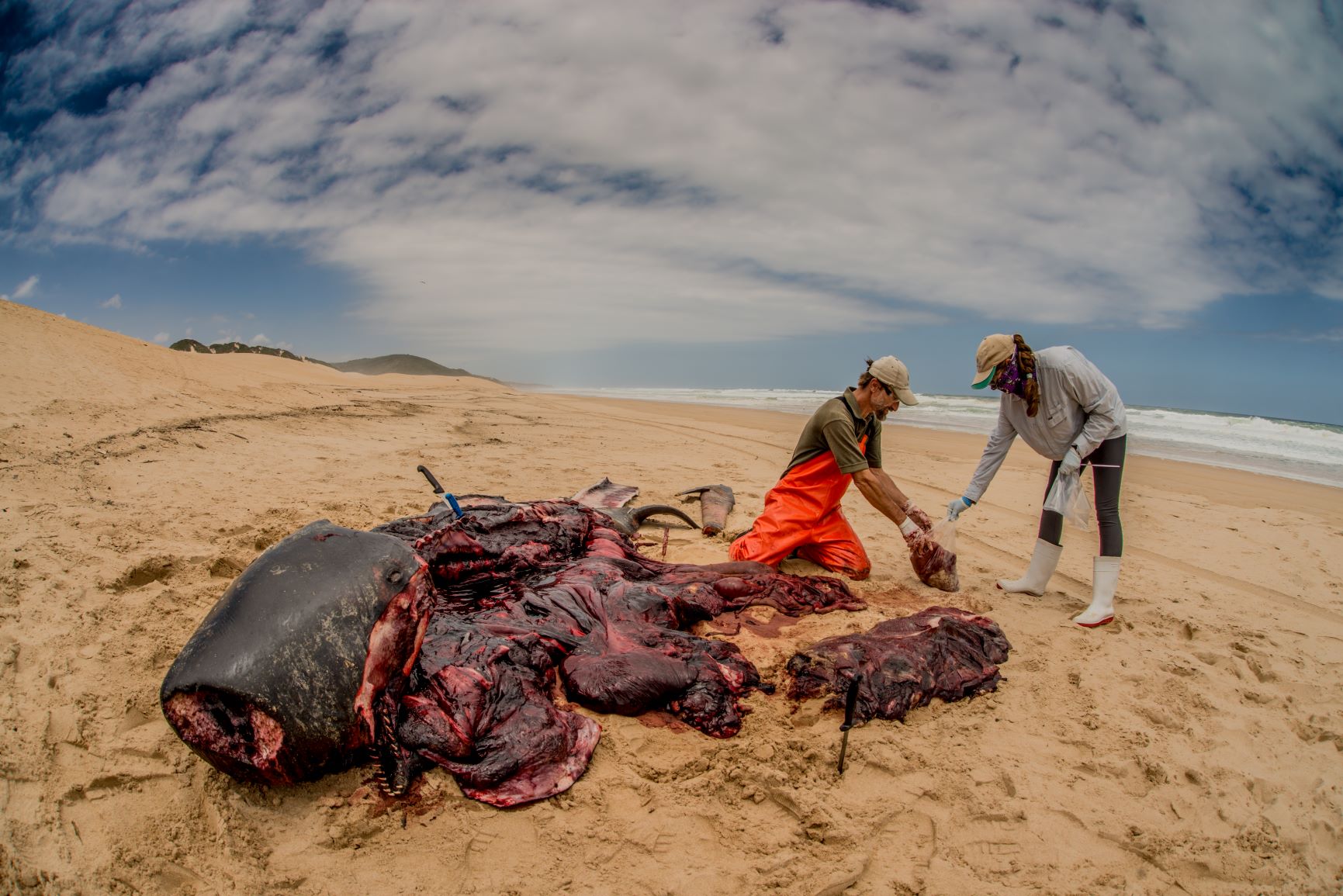 When I was very young I was keen to become a game ranger. While in high school this had morphed into being a zoologist. And this is the career that I was lucky enough to follow. It has given me wonderful opportunities and allowed me to do some fascinating things. I had always wanted to work in wild places and so arriving on Marion Island for the first time was like arriving in paradise. Before the end of my first year, I new that I had to return. I loved every moment on this rough place. Not only was it beautiful and challenging, but it also allowed one the opportunity to observe animals fairly closely and wonder about their way of life and behaviour. How did these very distant relatives of our survive in an environment so hostile to us? Thus it was also intellectually stimulating. And I have loved to return to wild places and ask questions about the natural work ever since.
When I was very young I was keen to become a game ranger. While in high school this had morphed into being a zoologist. And this is the career that I was lucky enough to follow. It has given me wonderful opportunities and allowed me to do some fascinating things. I had always wanted to work in wild places and so arriving on Marion Island for the first time was like arriving in paradise. Before the end of my first year, I new that I had to return. I loved every moment on this rough place. Not only was it beautiful and challenging, but it also allowed one the opportunity to observe animals fairly closely and wonder about their way of life and behaviour. How did these very distant relatives of our survive in an environment so hostile to us? Thus it was also intellectually stimulating. And I have loved to return to wild places and ask questions about the natural work ever since.
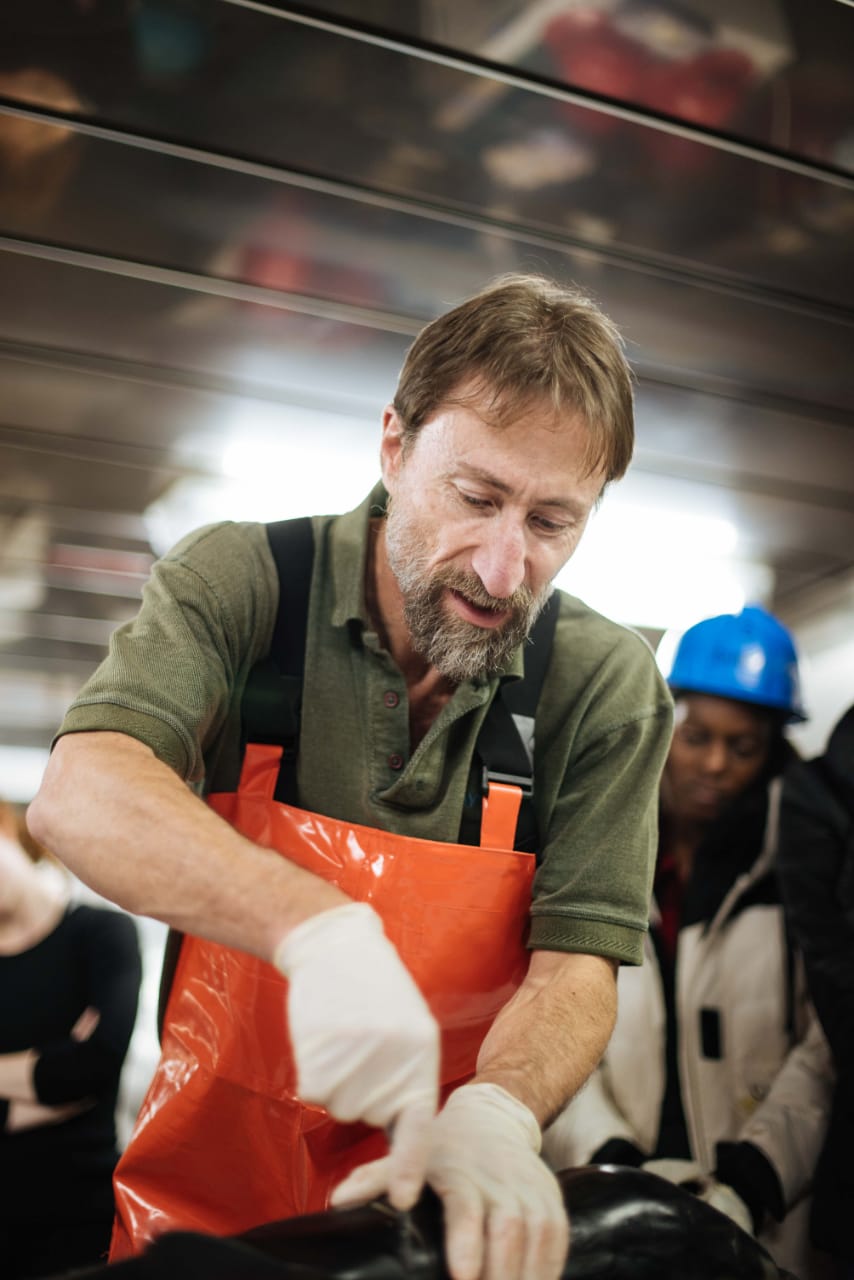
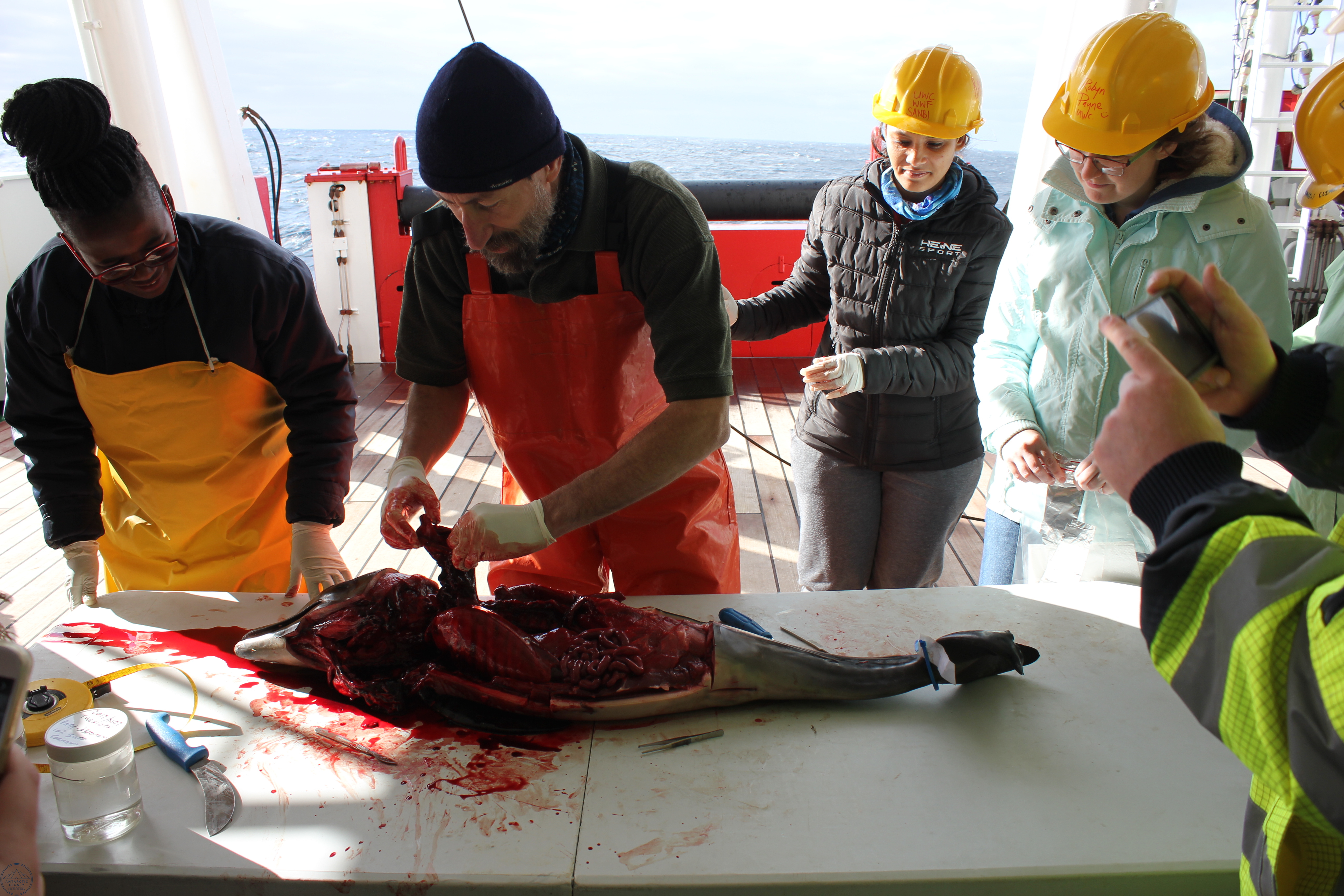 If you want to become a scientist, do what you love. It is a tough career that requires
If you want to become a scientist, do what you love. It is a tough career that requires
many long hours and much dedication. You will only succeed in this if you are fascinated by what you are doing. Also, if you are reasonably good and enthusiastic about what you are doing, a number of opportunities should come your way. Seize each one. Then, doing science gives you a real opportunity to make a difference. While science is an unparalleled means of understanding the world, it also offers opportunities to make the world a better place, for all life in it, including humans.
Text and images supplied by Greg Hofmeyr.
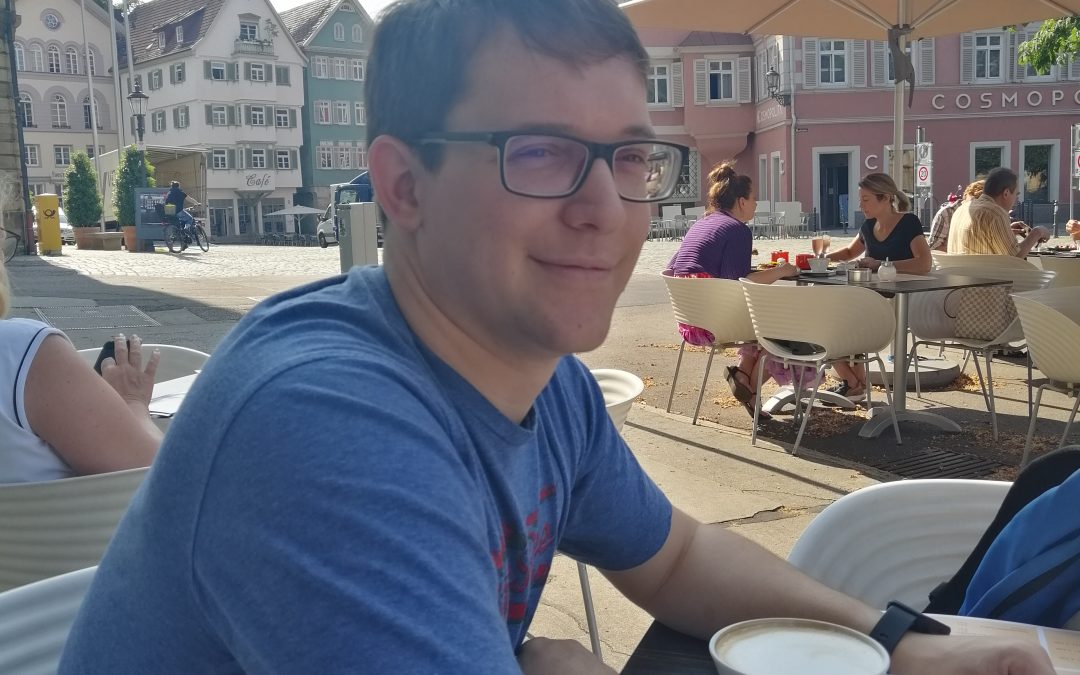
by Ria Olivier | Apr 18, 2020 | geochemistry, Research, Science, SEAmester, Southern Ocean
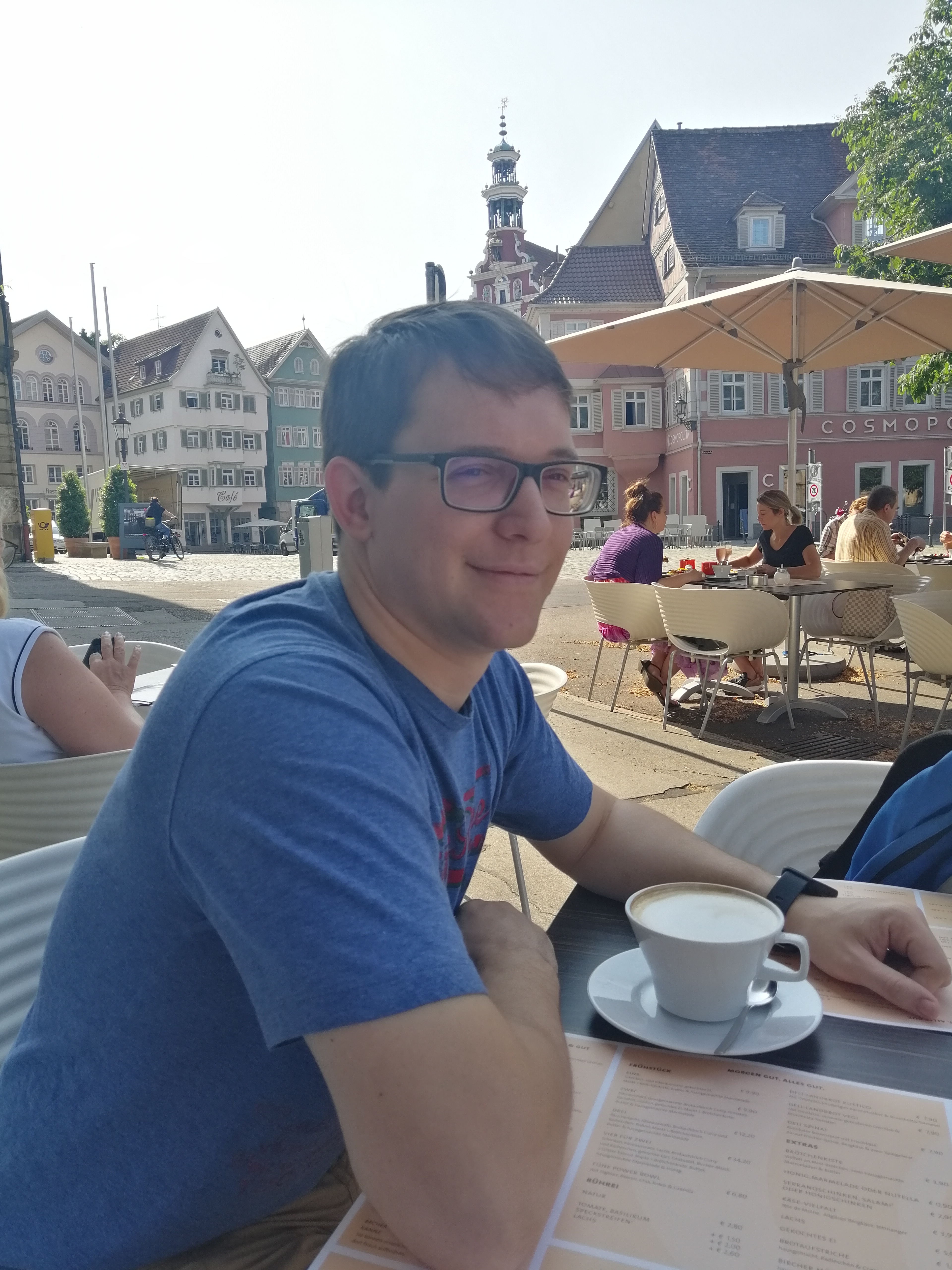
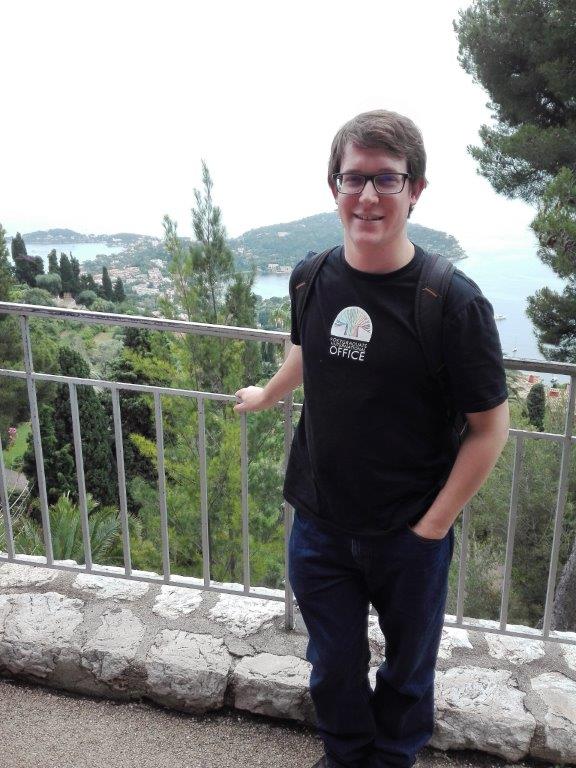 Johannes Jacobus Viljoen grew up in the small town of Wolseley in the upper Breede River Valley and started his tertiary education at Stellenbosch University after graduating high school in Ceres. He completed a BSc in Earth Science in 2015 and became the first member in his family with a university qualification. In 2016, he completed a BSc (Hons) Earth Science degree in Environmental Geochemistry where he gained a keen interest in marine biogeochemistry and research. He continued his studies as a graduate research student on phytoplankton distribution in the Southern Ocean at Stellenbosch University within the Centre for Trace and Experimental Biogeochemistry (TracEx ), earning a MSc degree (cum laude) in 2018.
Johannes Jacobus Viljoen grew up in the small town of Wolseley in the upper Breede River Valley and started his tertiary education at Stellenbosch University after graduating high school in Ceres. He completed a BSc in Earth Science in 2015 and became the first member in his family with a university qualification. In 2016, he completed a BSc (Hons) Earth Science degree in Environmental Geochemistry where he gained a keen interest in marine biogeochemistry and research. He continued his studies as a graduate research student on phytoplankton distribution in the Southern Ocean at Stellenbosch University within the Centre for Trace and Experimental Biogeochemistry (TracEx ), earning a MSc degree (cum laude) in 2018.
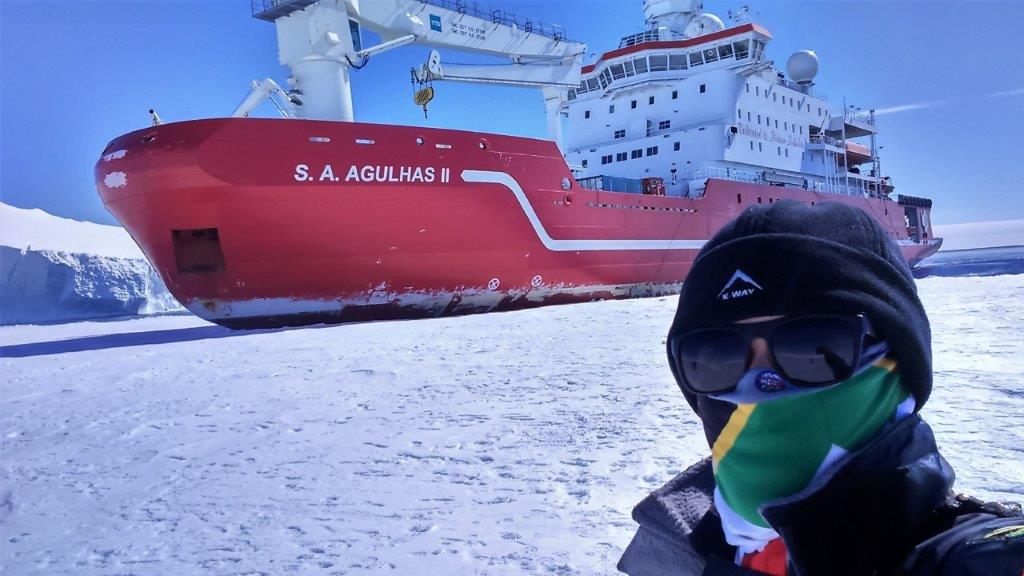
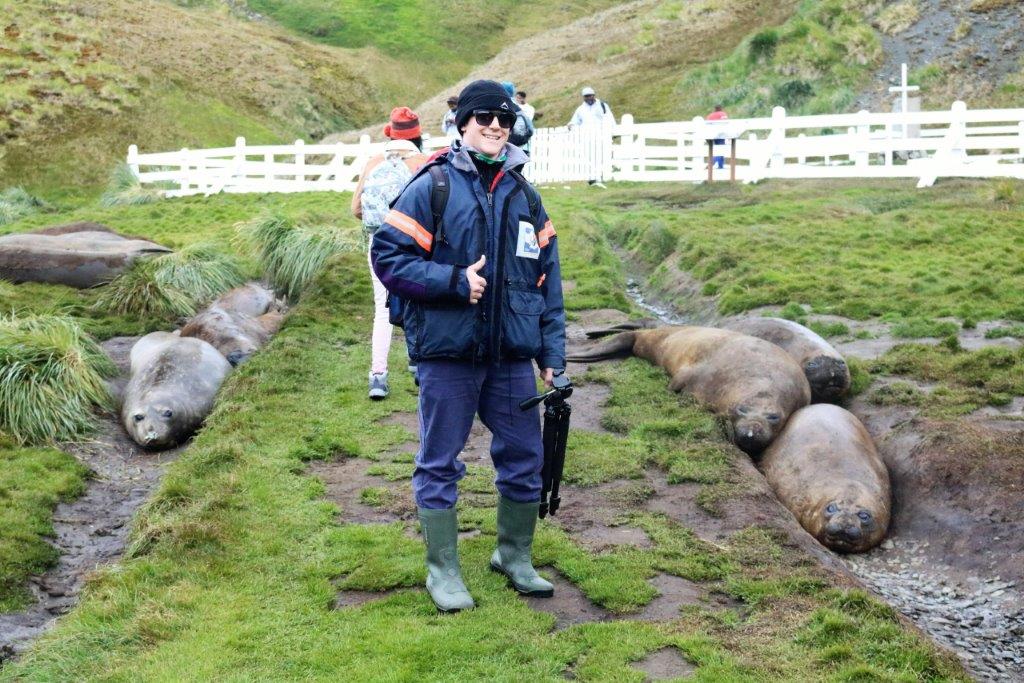 Johan is currently a PhD candidate in Earth Science at Stellenbosch University (SU). His research focus is part of a larger project within the South African National Antarctic Programme (SANAP) of which the main aim is to understand the biological and biogeochemical processes occurring in the Southern Ocean, how this is linked and will affect our global climate. His PhD research within TracEx revolves around marine biogeochemistry and aims to better understand phytoplankton dynamics in the Southern Ocean and their links to macro- and micronutrients distributions across various seasons and within poorly sampled regions. He specifically strives to specialize in the use of phytoplankton pigments to identifying and quantifying phytoplankton groups essential to the marine carbon cycle and assess their photoprotective abilities and adaptability within the current changing ocean environment. To date, Johan has participated in three research cruises on board South Africa’s flagship research vessel, the S.A. Agulhas II . For his first research cruise, a summer resupply cruise to Antarctica (SANAE 56: Nov 16 – Feb 17), he skipped his BSc (Hons) graduation in December 2016 to join this cruise and collect samples for multiple projects on his own. He wrote a blog tabout his experiences during this cruise and what it was like on the Antarctic ice shelf during the SANAE 56 take-over . He participated in two further research specific cruises to the Southern Ocean during winter as a member of the TracEx team, one to the Indian sector in July 2017 (for which he had to postpone his honeymoon ) and another to the Atlantic sector during the SCALE winter cruise (July/Aug 2019).
Johan is currently a PhD candidate in Earth Science at Stellenbosch University (SU). His research focus is part of a larger project within the South African National Antarctic Programme (SANAP) of which the main aim is to understand the biological and biogeochemical processes occurring in the Southern Ocean, how this is linked and will affect our global climate. His PhD research within TracEx revolves around marine biogeochemistry and aims to better understand phytoplankton dynamics in the Southern Ocean and their links to macro- and micronutrients distributions across various seasons and within poorly sampled regions. He specifically strives to specialize in the use of phytoplankton pigments to identifying and quantifying phytoplankton groups essential to the marine carbon cycle and assess their photoprotective abilities and adaptability within the current changing ocean environment. To date, Johan has participated in three research cruises on board South Africa’s flagship research vessel, the S.A. Agulhas II . For his first research cruise, a summer resupply cruise to Antarctica (SANAE 56: Nov 16 – Feb 17), he skipped his BSc (Hons) graduation in December 2016 to join this cruise and collect samples for multiple projects on his own. He wrote a blog tabout his experiences during this cruise and what it was like on the Antarctic ice shelf during the SANAE 56 take-over . He participated in two further research specific cruises to the Southern Ocean during winter as a member of the TracEx team, one to the Indian sector in July 2017 (for which he had to postpone his honeymoon ) and another to the Atlantic sector during the SCALE winter cruise (July/Aug 2019).
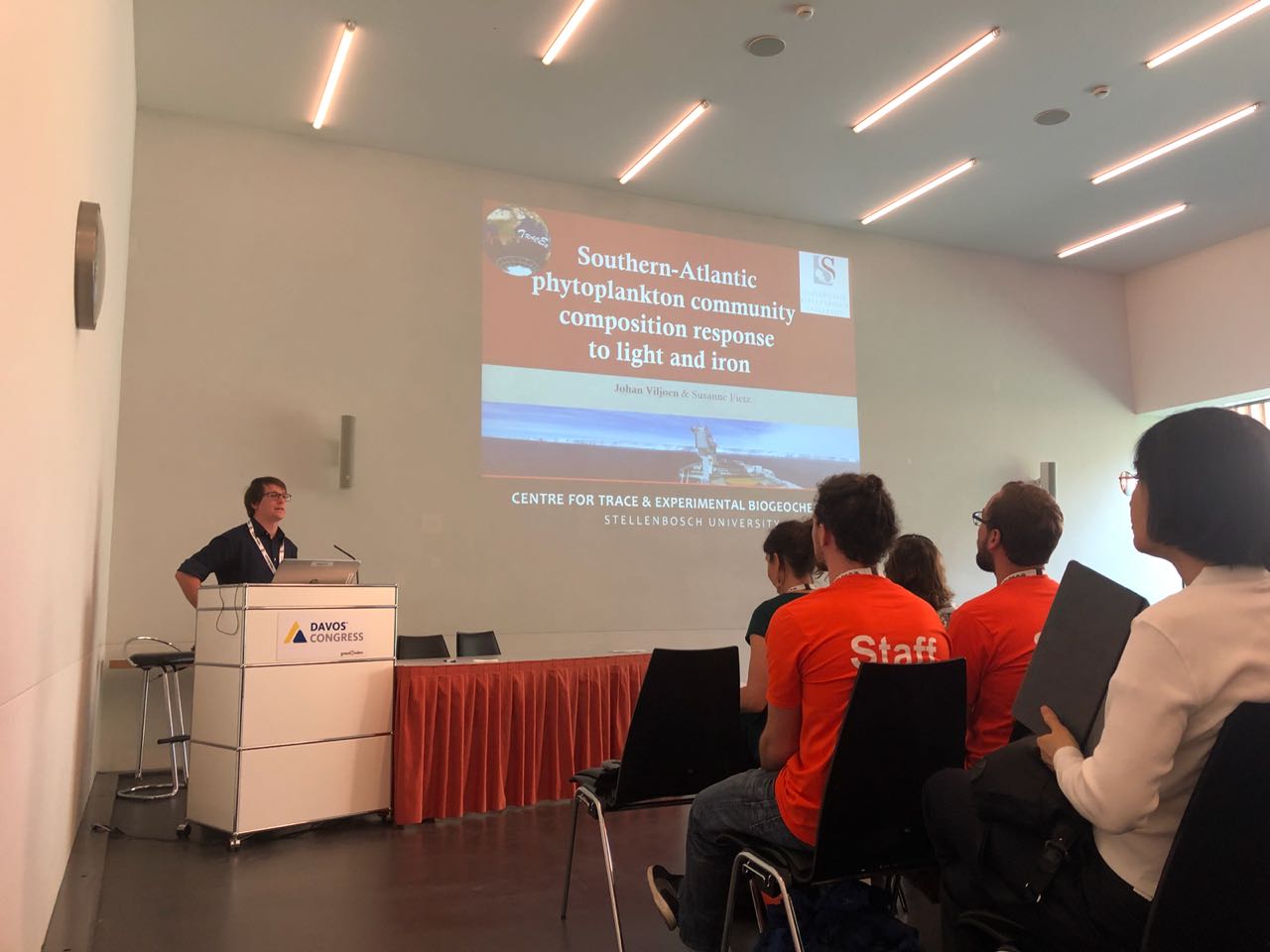 He attended his first SANAP symposium in 2016. He attended the Polar 2018 conference in Davos, Switzerland in 2018 where he presented an oral presentation on his research. He later joined the South African branch of the Association for Polar Early Career Scientists (APECS-SA) as a committee member during his second SANAP symposium in 2018. He currently serves on the APECS-SA national committee as one of the co-chairs. From 2018 – 2019, he also served as the postgraduate representative of the Department of Earth Sciences at SU on the postgraduate committee of the Faculty of Science.
He attended his first SANAP symposium in 2016. He attended the Polar 2018 conference in Davos, Switzerland in 2018 where he presented an oral presentation on his research. He later joined the South African branch of the Association for Polar Early Career Scientists (APECS-SA) as a committee member during his second SANAP symposium in 2018. He currently serves on the APECS-SA national committee as one of the co-chairs. From 2018 – 2019, he also served as the postgraduate representative of the Department of Earth Sciences at SU on the postgraduate committee of the Faculty of Science.

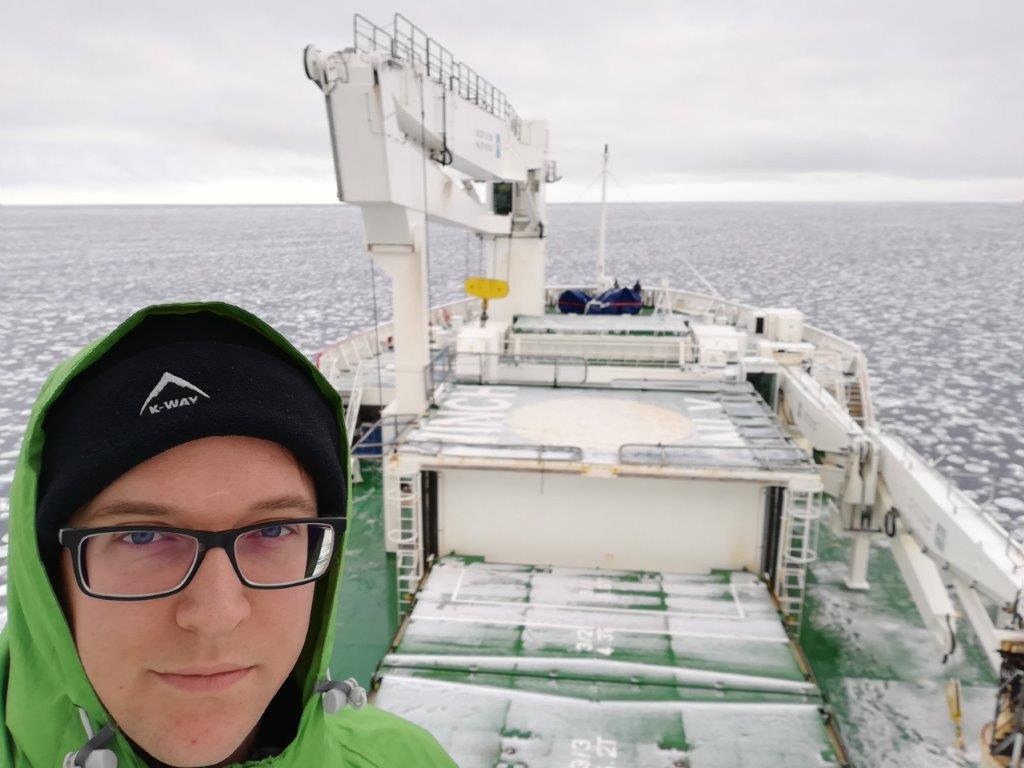 Johan is driven to learn more about marine science and sharing his research and experiences with others. To date, he has published two scientific articles from his MSc research and aims to follow an academic career. In August 2017, he was awarded the opportunity by the SU International office to attend a summer school at the University of Helsinki: Introduction to modern atmospheric science. In September 2019, he was awarded a SCOR travel bursary to attend the 2nd International Geotraces Summer School in Spain to further his knowledge about trace metals and their role in the marine environment.
Johan is driven to learn more about marine science and sharing his research and experiences with others. To date, he has published two scientific articles from his MSc research and aims to follow an academic career. In August 2017, he was awarded the opportunity by the SU International office to attend a summer school at the University of Helsinki: Introduction to modern atmospheric science. In September 2019, he was awarded a SCOR travel bursary to attend the 2nd International Geotraces Summer School in Spain to further his knowledge about trace metals and their role in the marine environment.
He is also active on Twitter (@JohanSOV ), utilising social media to promote his and other marine science research. He also has a vested interest in science communication and attended a master class in science communication offered by CREST at SU in December 2019 to advance his skills in science communication. He has volunteered at the retirement home in his hometown, talking to those less mobile about his experiences onboard the SA Agulhas II and the history of SA in Antarctica. He and other members of TracEx have participated in multiple outreach visits of primary and high schools to their department and have been volunteer guides for first year BSc student onboard the S.A. Agulhas II.
 In his free time, he enjoys spending time with his family and friends, watching documentaries and movies based on true events, reading, hiking and travelling. He considers himself to be a bit of a coffee connoisseur, a budding gardener and an experimental cook.
In his free time, he enjoys spending time with his family and friends, watching documentaries and movies based on true events, reading, hiking and travelling. He considers himself to be a bit of a coffee connoisseur, a budding gardener and an experimental cook.
With determination, hard work and by accepting help when needed you can reach any goal. “Alone we can do so little; Together we can do so much.” Helen Keller
Photo Credit and Text: Johan Viljoen – Profile
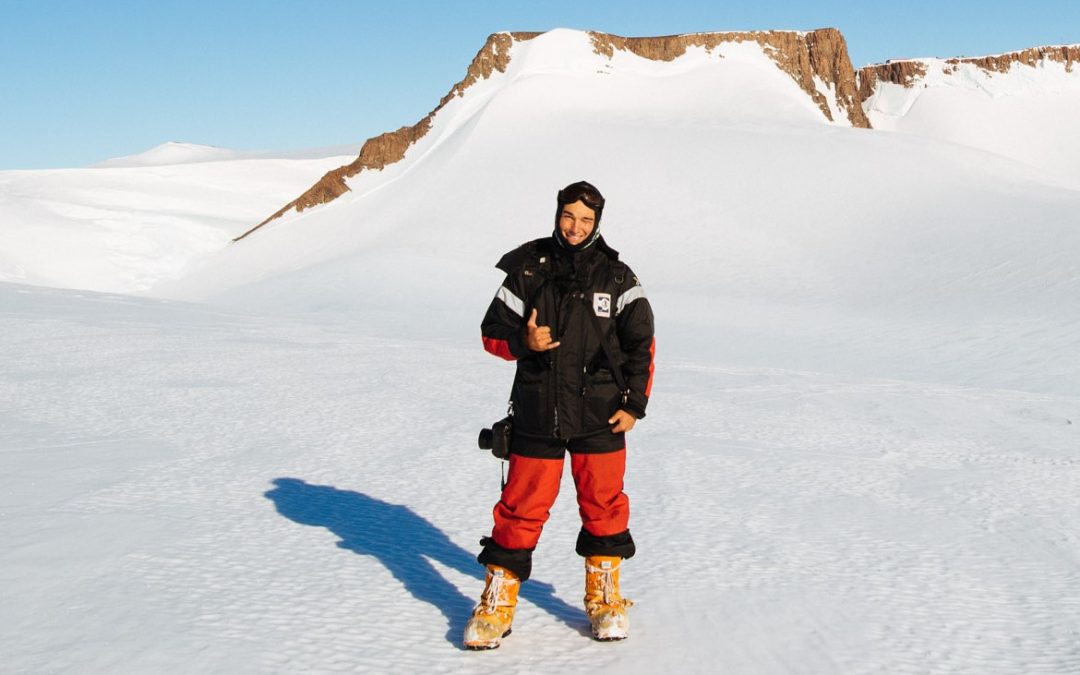
by Ria Olivier | Mar 20, 2020 | Antarctica, Discover, Environment, SANAE, SANAP, SEAmester, Take-Over Operations
Our mid-Month Series also include those people that has become part of the SANAP community and do a lot of 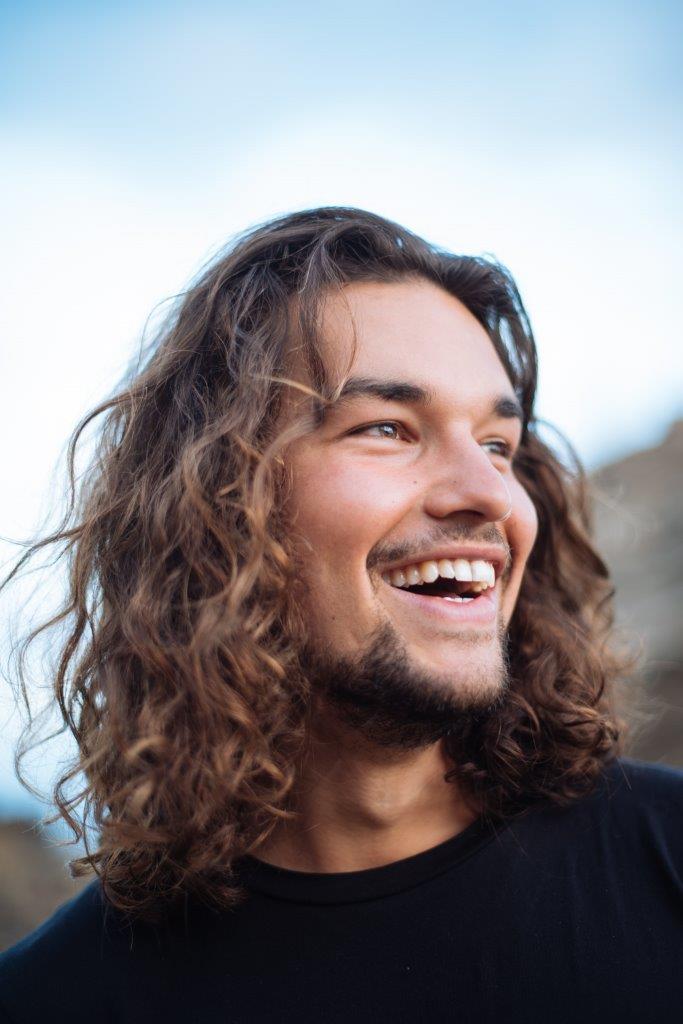 freelance and volunteer work for SANAP. Alexander Oelofse is becoming a well-known name within the SANAP community. His videos of SEAmester give a real insight to the SEAmester program. ALSA
freelance and volunteer work for SANAP. Alexander Oelofse is becoming a well-known name within the SANAP community. His videos of SEAmester give a real insight to the SEAmester program. ALSA 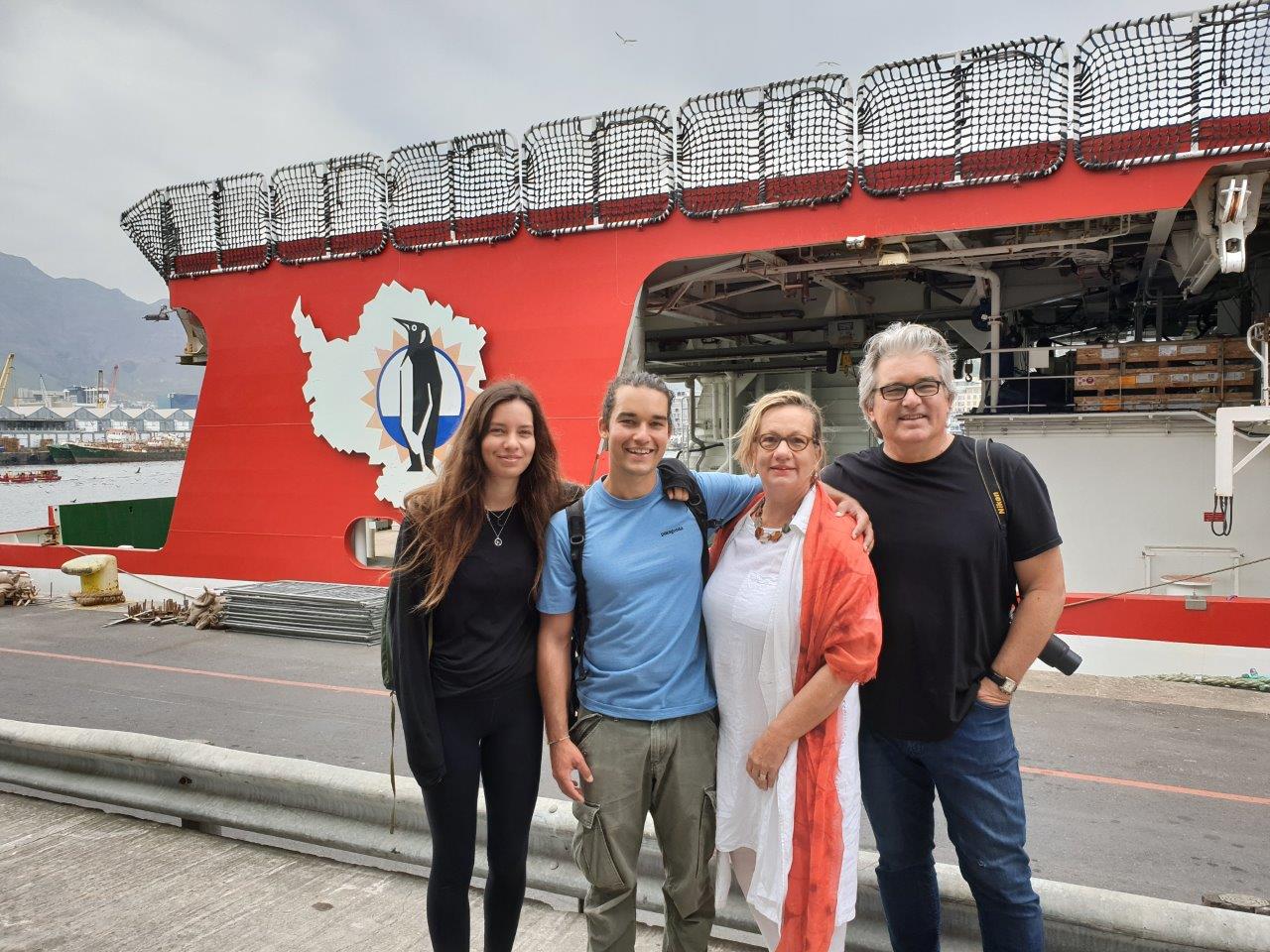 realized that as freelancer he can be of great service to the community and to ALSA. During the Departure of SANAE59 an agreement was reached to compile videos during takeover. Ria Olivier met with him after his expedition at Iziko during the Sentinels of the South exhibition launch and possibilities were discussed of his contributions toward the Antarctic legacy of our country.
realized that as freelancer he can be of great service to the community and to ALSA. During the Departure of SANAE59 an agreement was reached to compile videos during takeover. Ria Olivier met with him after his expedition at Iziko during the Sentinels of the South exhibition launch and possibilities were discussed of his contributions toward the Antarctic legacy of our country.
ALSA asked him when he got interested in photography?
What started off as a childhood dream turned into a reality on the 2019/2020 Antarctic relief voyage. I have always had a deep love for the ocean and knew from a young age 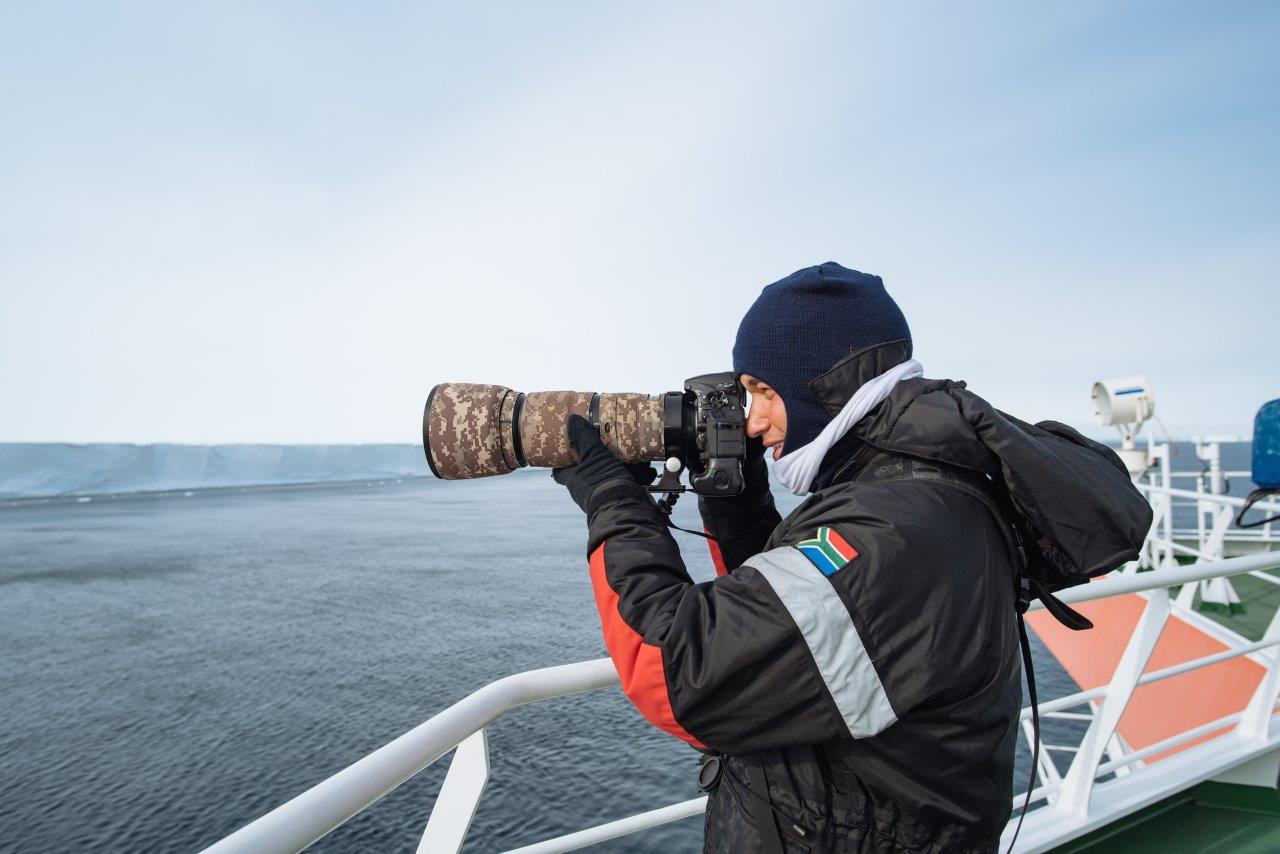 that I would want to be in, or surrounded, by the ocean as much as possible. I wanted to study marine biology for a long time. Until job shadowing a marine biologist and realising much of the work would be lab-based. I couldn’t imagine that for myself. I then decided to pursue my other passion; photography. Being a member of the photographic society in high school sparked my interest. This led to me studying fine art photography at Michaelis in Cape Town. At Michaelis, I continued to create art centering around the environment.
that I would want to be in, or surrounded, by the ocean as much as possible. I wanted to study marine biology for a long time. Until job shadowing a marine biologist and realising much of the work would be lab-based. I couldn’t imagine that for myself. I then decided to pursue my other passion; photography. Being a member of the photographic society in high school sparked my interest. This led to me studying fine art photography at Michaelis in Cape Town. At Michaelis, I continued to create art centering around the environment.
How did he become involved in SANAP?
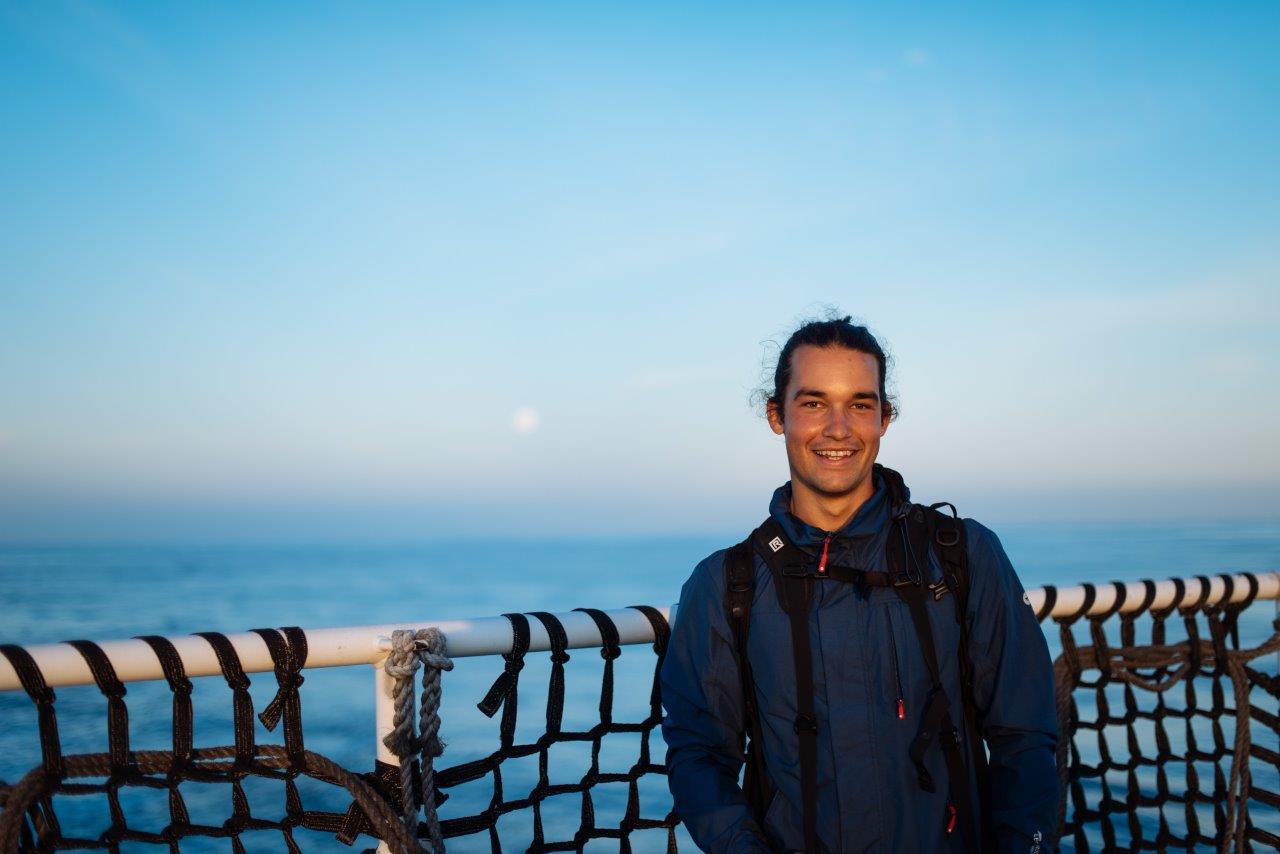 While at University I already started trying to find a way onboard the S.A. Agulhas II. I had to see this stark, extreme and yet breathtakingly beautiful landscape for myself. It took a few years of applying, without succeeding, until I could get onboard the SEAmester III as a lecturer after my studies. Onboard students from various universities around South Africa get the opportunity to experience oceanographic research at its best, out in the field, onboard the S.A. Agulhas II. To have the privilege to experience SEAmester as a student must be absolutely amazing, but more importantly, the eye-opening experience that can lead some students to follow their passions in the marine studies field.
While at University I already started trying to find a way onboard the S.A. Agulhas II. I had to see this stark, extreme and yet breathtakingly beautiful landscape for myself. It took a few years of applying, without succeeding, until I could get onboard the SEAmester III as a lecturer after my studies. Onboard students from various universities around South Africa get the opportunity to experience oceanographic research at its best, out in the field, onboard the S.A. Agulhas II. To have the privilege to experience SEAmester as a student must be absolutely amazing, but more importantly, the eye-opening experience that can lead some students to follow their passions in the marine studies field.
Opportunity to go to Antarctica:
After doing two SEAmester Expeditions the opportunity came up to go down to Antarctica with UCT. He grabbed the opportunity with both hands. 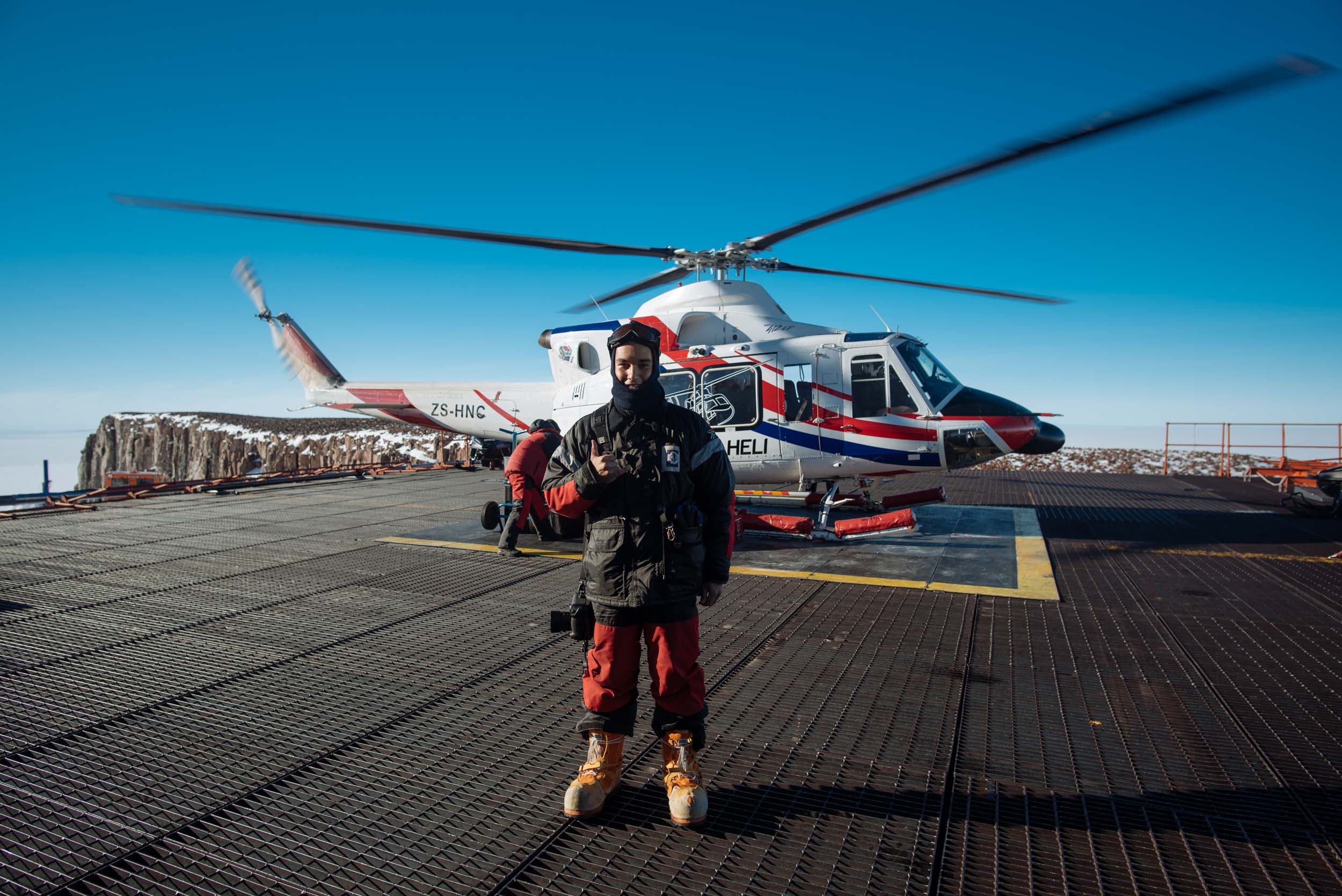 He departed on the first leg of the relief voyage of 2019/2020. I can’t really say I had any expectations, to be frankly honest. AS he has never seen a place like the Antarctica and not having any expectations, it lead to some of his best experiences. He admits that sailing down for 9 days to reach the ice shelf definitely adds to the anticipation and the surprise that is Antarctica. Visit his website to see his collection of Antarctic Images
He departed on the first leg of the relief voyage of 2019/2020. I can’t really say I had any expectations, to be frankly honest. AS he has never seen a place like the Antarctica and not having any expectations, it lead to some of his best experiences. He admits that sailing down for 9 days to reach the ice shelf definitely adds to the anticipation and the surprise that is Antarctica. Visit his website to see his collection of Antarctic Images
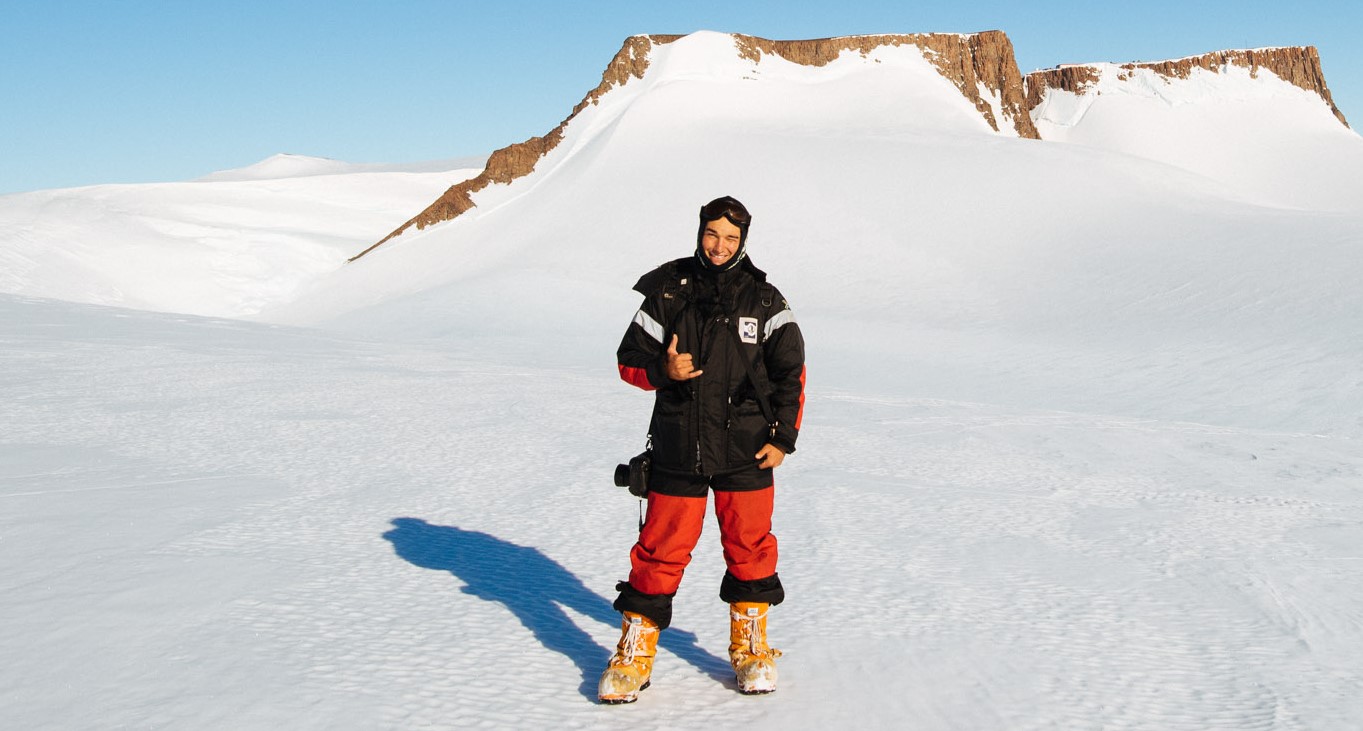 “Seeing the ice shelf for the first time left me speechless. I became quite emotional, realising my dream had come true”.
“Seeing the ice shelf for the first time left me speechless. I became quite emotional, realising my dream had come true”.
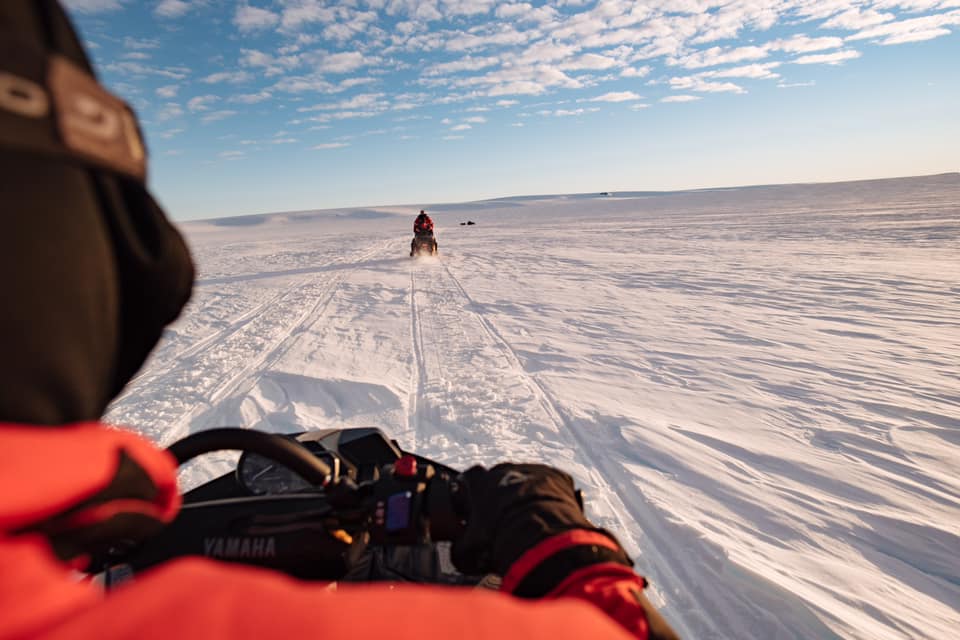 “One of my highlights was getting to sit on the back of a snowmobile and traverse the snowy landscapes. Being the passenger allowed me to, despite the icy breeze, absorb the sublime landscapes that we passed through. This image was captured at 02:00 am. You could see the sun dip ever so slightly but never setting. I could get used to that. It made life seem endless, like there was no rush”
“One of my highlights was getting to sit on the back of a snowmobile and traverse the snowy landscapes. Being the passenger allowed me to, despite the icy breeze, absorb the sublime landscapes that we passed through. This image was captured at 02:00 am. You could see the sun dip ever so slightly but never setting. I could get used to that. It made life seem endless, like there was no rush”
Alex Oelofse is looking forward to working alongside ALSA to inspire youth and spread the information about the amazing program that South Africa runs all the way down in Antarctica.
His contributions will soon be available on the ALSA archive and see in next Mid-Month series one of his videos.
All Images copyright Alexander Oelofse
Visit his website https://www.alexanderoelofse.com/ and Instagram

by Ria Olivier | Feb 5, 2020 | Announcement, Current Event, Fellowship, SA Agulhas II, SEAmester, Southern Ocean, Uncategorised

CLOSING DATE extended to 13 MARCH 2020
DOWNLOAD APPLICATION FORMS
SEAmester – South Africa’s Class Afloat aims to introduce marine science as an applied and cross-disciplinary field to students who have shown an affinity for core science disciplines. It will combine traditional class-room lectures with hands-on ship-based deck activities for a maximum of 46 students; while providing them with an opportunity to support specialist scientists in recognised marine research activities. Our research group comprises of over 30 oceanographic, fisheries, biogeochemical and biological experts, who jointly have trained over 600 Southern African students on-board a wide variety of international and local research vessels. read more at SEAmester website
How do I qualify?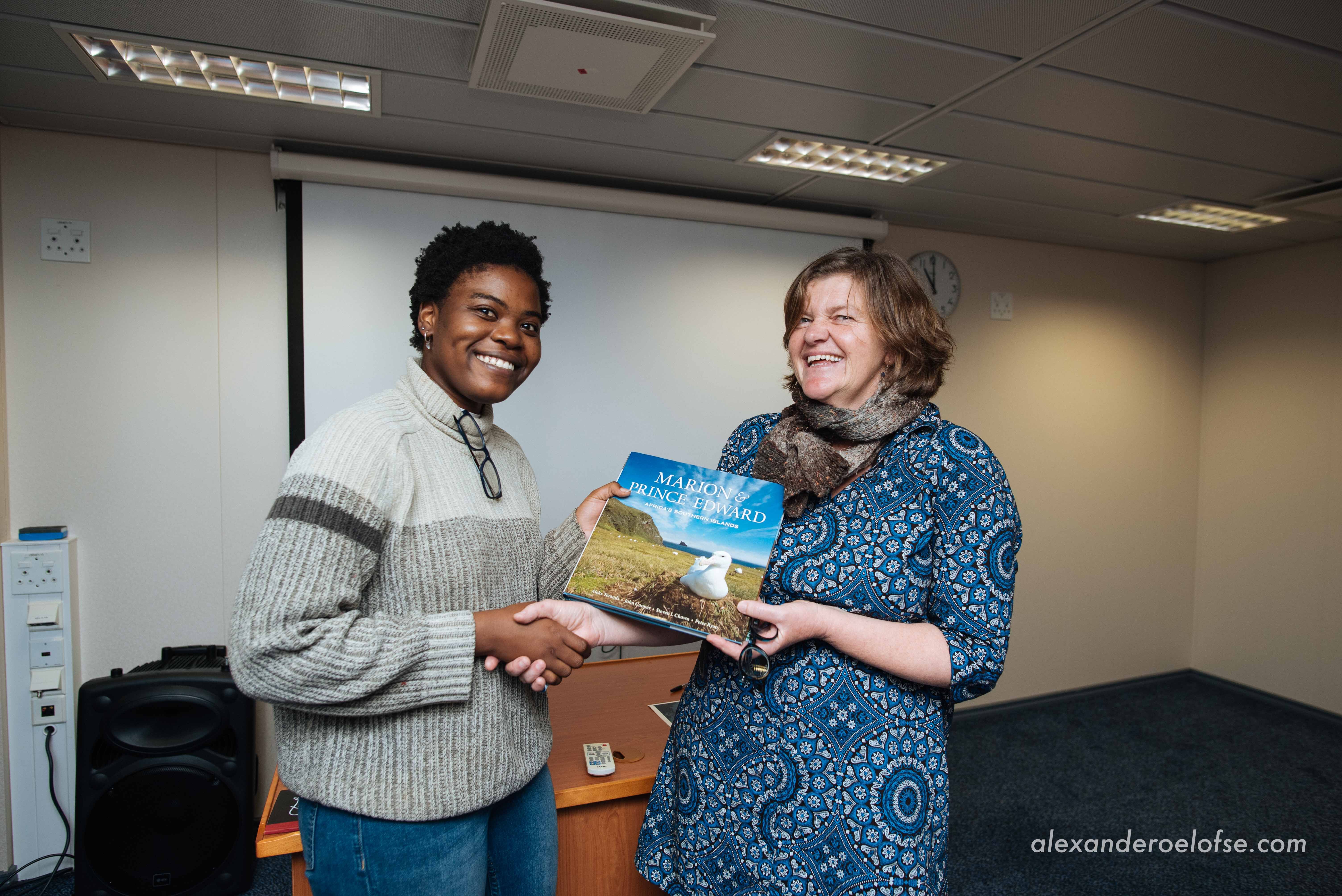
A maximum of 46 post-graduate (Honours/BTech, MSc/MTech, PhD and Interns) University and Technikon students will be selected nationwide. Applications will be accepted from currently registered post-graduate students with a background in marine or similar sciences. Past sea-going experience is not compulsory. Left: Rudzanie Silima best Student SEAmester 2019 with Prof Isabelle Ansorge of UCT
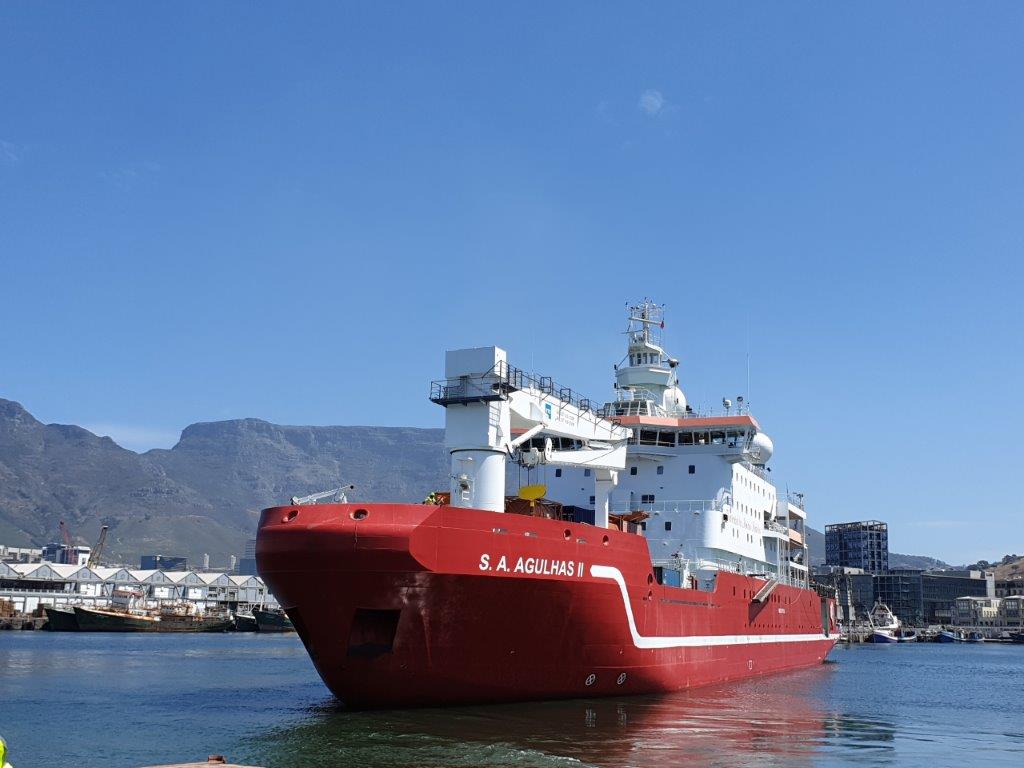 What ship will SEAmester take place on?
What ship will SEAmester take place on?
The new South African polar research vessel SA Agulhas II will be used for SEAmester V. The SA Agulhas II is a state-of-the-art icebreaker and is fully equipped for all marine research activities. To find out more go to http://www.sanap.ac.za/
What will it cost me?
Nothing. SEAmester is fully funded through the Departments of Science and Technology (DST) and Environmental Affairs (DEA). All board and lodging onboard the SA Agulhas II will be provided free of charge through SEAmester.
What research will SEAmester be involved in??
SEAmester will run in parallel to the scientific objectives of the Agulhas System Climate Array (ASCA) spearheaded by DSTs SAEON Egagasini node. ASCA is a multi-institutional, international collaboration and designed to provide the first long-term observations of Agulhas Current volume, heat and salt transport and its variability from seasonal to interannual timescales. ASCA’s objectives are to determine how the Agulhas Current and its role in the global conveyor belt varies over time. To find out more go to http://asca.dirisa.org
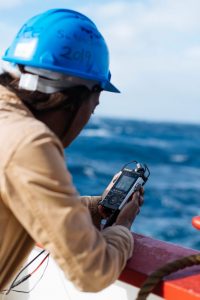
Listening for mammal sounds.
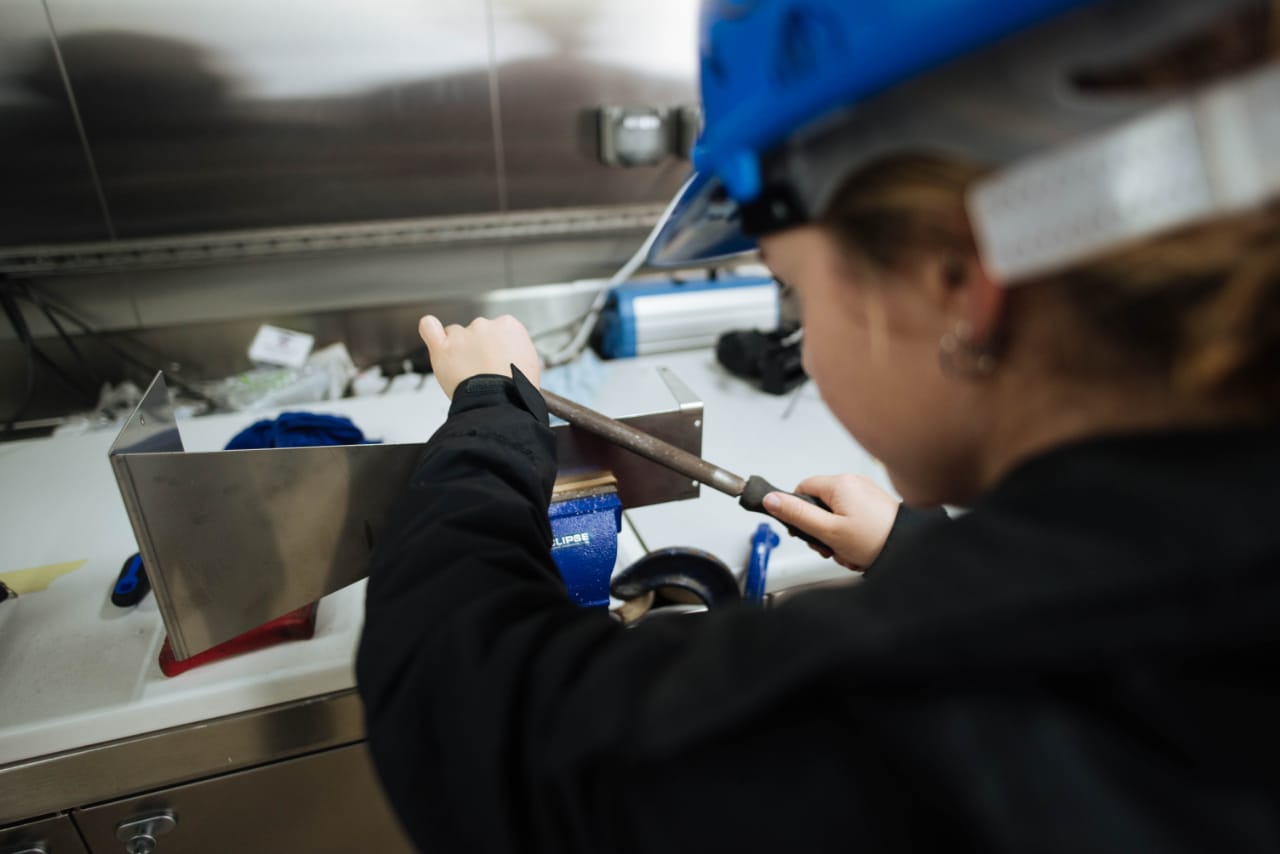
Working on their Aghulus bottle opener in the practical session.
What will be expected from me?
You will be expected to choose one of two module steams – either Tools of the Trade or Oceans in a Changing World (see overleaf). Learning will comprise of daily class-room lectures, daily assignments and deck work – running in parallel to the ASCA programme. Students from both streams will also provide research support to specialist scientists and obtain daily hands-on deck training, data collection, sampling and data analysis. Each student will gain experience working with the full suite of oceanographic, atmospheric and biological ship-based instrumentation such as CTD, underway measurements and autonomous devices such as Argo, SVP drifters as well as gain experience on all biological net tows. Training on data analysis following each deployment will be given, as well as technical and electronic experience in calibrating, assembling and modifying each instrument. In addition, each student will work on a specific scientific mini-project related to their area of interest and the scientific research underway.
What are the tentative dates for SEAmester?
SEAmester will depart on the 13th July returning to Cape Town on the 24th July 2020. Travel arrangements and costs will be made through the SEAmester programme for all students residing outside of the Western Cape. PLEASE NOTE: Applicants to be aware that the cruise dates may be subject to change by a few days.
What travel documentation must I have?
SEAmester will be working outside of South African waters and therefore all participants are requested to have a valid passport. SAMSA approved medicals will be required and costs incurred will be covered by the SEAmester programme. Students with study visas need to ensure that their visas have not expired.
Is there reading material – See the attached files (SANCOR site) for any additional reading material, or contact Isabelle.Ansorge@uct.ac.za
See SEAmester 2019 videos on SEAmester website as well as the previous years
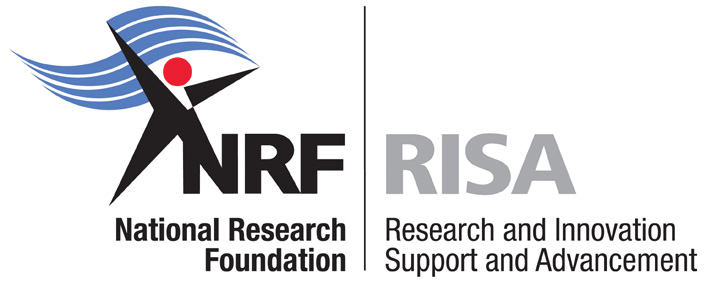
by Fishgate@sanap | Aug 21, 2018 | Announcement, Antarctica, Gough Island, Legacy, Marion Island, Research, SANAP, Science, SEAmester, Southern Ocean, sub-Antarctic
FIFTH SANAP SYMPOSIUM : OPENING REMARKS (13 August 2018)
Gansen Pillay PhD
DCEO: Research and Innovation Support and Advancement (RISA)
Distinguished Participants
It is a pleasure and privilege to provide some Opening Remarks on behalf of the National Research Foundation (NRF) of SA on the occasion of the 5th SANAP Symposium jointly hosted by CPUT and SANSA. This afternoon, I would like to focus on four dimensions.
Firstly, I would like to focus on this Symposium and its importance. Secondly, I would like to explore the strategic positioning of SANAP and its related research areas in the context of a global research agenda. Thirdly, we will share with you the latest information relating to the funding of SANAP by the NRF. And finally, I would like to focus on training the next generation of researchers, viz., our postgraduate students.
Our sincere congratulations to the Conference Organisers for conceptualising the content and themes for this Symposium. Hermanus as a venue could not have been more ideal venue given the themes of this meeting. This Symposium signifies a meeting of the oceans and space, each looking at the other through different lenses, yet focusing on the common good of responsiveness, relevance and sustainability.
We take the opportunity of congratulating Prof Isabelle Ansorge and her joint authors for the timely article in the South African Journal of Science (SAJS) titled “SEAmester – SA’s first class afloat”. It intersects the Global Change Grand Challenge and draws on Operation Phakisa. As you may be aware, one of NRF’s National Research Facilities (NFs), viz., the SA institute for Aquatic Biodiversity (SAIAB) is a partner in this initiative. This goes a long way towards accelerating NRF’s objective of not just providing NFs but National Research Infrastructure Platforms (NRIPs).
We would also like to commend SANAP on its new SANAP portal and website (www.sanap.ac.za), the Antarctic Legacy Platform (http://blogs.sun.ac.za/antarcticlegacy/). It is current and informative and its presence on Facebook and other social media platforms is very encouraging.
The public lecture on ‘South Africa’s legacy within the Antarctic region’ being presented this evening is timely and critical to the public understanding of science.
This symposium provides delegates the opportunity to present their research within the Southern Ocean, Antarctic and sub-Antarctic regions.
Interwoven into the fabric of the Symposium is a rich tapestry of complementary themes on (i) A window into geospace; (ii) Southern Oceans in the coupled ocean; (iii) Carbon-climate links and geotraces; (iv) Ecosystem functioning and the response to global change; (v) Biodiscovery and biotechnology; (vi) Earth and living systems; (vii) Paleosciences and human history; and (viii) Innovation, technology and engineering. A research canvas of this nature offers enormous possibilities.
Given the aforementioned, I would like to move to the second dimension of my Opening Remarks, viz., the strategic positioning of SANAP research in the global research agenda. One of the hallmarks of any successful organization or company like Apple is the ability to respond to change. Those who adapt to change, survive. Those who do not, perish. A systems thinking approach is essential.
When one looks at the various themes of this Symposium its main focus is on interactions and the ability to respond to change. So what exactly happens in the Southern Oceans and Space? Is there a constant quest for dynamic equilibrium and sustainability? Is there a symphony at play that is being orchestrated and conducted by global climate change? What are SA’s geographic and competitive advantages? In responding to how we position SANAP, we have to accept that we cannot be everything to everyone. So what is it that we do that is unique or what is it that we do exceptionally well? More importantly, what should we stop doing?
In positioning our research there are some aspects that we must factor. These include, inter alia, how do we plan for impact? How do we manage impact? What is the potential for translational research? What are the alignments to national priorities, the draft White Paper on Science, Technology and Innovation (STI), the NDP, Agenda 2063, the Sustainable Development Goals (SDGs), the World in 2050, the Belmont Forum, Future Earth, etc. Would Artificial Intelligence (AI) and Robotics come into play? What about quantum computing? Machine learning? How would you be dealing with Big Data? Do you have the capacity to deal with Big Data? I leave you with these questions as you contemplate the future of your research during this Symposium.
Thirdly, over the next three years, the NRF has made the following investments in SANAP:
- 29 grant holders:
- 23 rated: 3A-rated, 6 B-rated, 2 P-rated, importantly 4 Y-rated
- 16 female; 13 male
- Currently, only 4 grant holders are Black which is an are that requires attention and intervention
- There is growing evidence of young talent, especially black and female, moving up through the ranks. Many of SANAP’s early career researchers were students supported though this programme. But it is not enough. Much more needs to be done to bring in smart young students from previously disadvantaged backgrounds and institutions.
Finally, I would like to focus on the numerous postgraduate students who are here today. One of the most important aspects at the beginning of your research is its conceptualisation. Read widely, and know the entire backdrop/canvas of your research. Identify the gaps in knowledge and develop smart research questions/hypotheses. Use the latest methodologies in your field to explore these research questions. The information/data that you produce must be engaged with against the backdrop of existing knowledge. What is the new knowledge that you have produced? Production of new knowledge is the hallmark of a PhD degree and is immortalised through your scholarly publications or translational research. Remember, it is often easier to choose a wife, husband or life partner than to choose a supervisor. So choose smartly and wisely. Good luck with your studies!
Despite the constrained fiscal environment, the NRF would continue to fund excellent, transformative research that enables SA to meaningfully contribute to the SDGs.
In conclusion, I would like to wish you every success in your research and thank you in advance for your contributions to society.
May you have a whale of a time in Hermanus!!
END

Posted by: Ria Olivier (Antarctic Legacy of South Africa), 21 August 2018




 Isabelle as a child always wanted to be an oceanographer. “When I was 13 my father sent me off for 6 months on a Tall Ship to sail around Africa. And so, having grown up on sailing ships and sailing the world at a very young age it seemed only natural to follow in my passion to build a career around the sea.
Isabelle as a child always wanted to be an oceanographer. “When I was 13 my father sent me off for 6 months on a Tall Ship to sail around Africa. And so, having grown up on sailing ships and sailing the world at a very young age it seemed only natural to follow in my passion to build a career around the sea.

 I first studied at Plymouth University in the UK, where I completed a BSc in Ocean Sciences in 1992. I came to South Africa in 1993 and under the mentorship of Professor Lutjeharms in the Oceanography Department at UCT I started to turn this passion into a sea-going academic career.
I first studied at Plymouth University in the UK, where I completed a BSc in Ocean Sciences in 1992. I came to South Africa in 1993 and under the mentorship of Professor Lutjeharms in the Oceanography Department at UCT I started to turn this passion into a sea-going academic career.

 One of my first jobs at UCT was to gain seagoing experience in working with all ship-based equipment. I loved being at sea and felt that after my many experiences on both national and international research vessels that I would be good at teaching practical oceanography. And so began a long period of sea-going adventures between 1996 and 2016 in which UCT Honours students were taken to sea onboard the old SA Agulhas I and from 2012 the new SA Agulhas II. The training was always part of the 5 week Prince Edward Island relief voyage and in those days students had to work the winches, drive the CTD software, work up the data for mini-projects!
One of my first jobs at UCT was to gain seagoing experience in working with all ship-based equipment. I loved being at sea and felt that after my many experiences on both national and international research vessels that I would be good at teaching practical oceanography. And so began a long period of sea-going adventures between 1996 and 2016 in which UCT Honours students were taken to sea onboard the old SA Agulhas I and from 2012 the new SA Agulhas II. The training was always part of the 5 week Prince Edward Island relief voyage and in those days students had to work the winches, drive the CTD software, work up the data for mini-projects!
 Isabelle’s Working Life: “I was employed as a lecturer at UCT in 2006 and have worked hard to build a career both nationally and internationally in observational oceanography. My passion and love for the sea can be seen in the many opportunities that I create for students both at UCT, and as can be seen from the SEAmester Floating University across the entire country. I was the first female PhD graduate in Oceanography at UCT in 2000, I am the only female Full Professor in the Oceanography Department and the first female Head of Department in 2016. “
Isabelle’s Working Life: “I was employed as a lecturer at UCT in 2006 and have worked hard to build a career both nationally and internationally in observational oceanography. My passion and love for the sea can be seen in the many opportunities that I create for students both at UCT, and as can be seen from the SEAmester Floating University across the entire country. I was the first female PhD graduate in Oceanography at UCT in 2000, I am the only female Full Professor in the Oceanography Department and the first female Head of Department in 2016. “

 What drives me:” I love teaching students. Taking a student to sea and watching them learn and seeing their eyes light up when they first board the SA Agulhas II is extremely rewarding. Many of my former students have returned to sea either as senior researchers leading their own cohort of students, or they have built their career in marine management or moved into the academic field. It is so rewarding see young inexperienced students join a cruise and leave imbued with a new confidence and a passion for their discipline.
What drives me:” I love teaching students. Taking a student to sea and watching them learn and seeing their eyes light up when they first board the SA Agulhas II is extremely rewarding. Many of my former students have returned to sea either as senior researchers leading their own cohort of students, or they have built their career in marine management or moved into the academic field. It is so rewarding see young inexperienced students join a cruise and leave imbued with a new confidence and a passion for their discipline. “I am proud of the SEAmester programme and how we have been able to develop linkages with traditionally non marine universities both through their students joining as SEAmester students or their own Lecturers joining the academic programme. The state-of-the-art research vessel, SA Agulhas II, provides such an incredible teaching and research platform for this programme; its size, comfort and shipboard facilities allow groups of 46 students and 30 lecturers to productively interact over a period of 10 days as can the photo of Prof Gammon teaching students in the ship’s stairwell shows so well!.”
“I am proud of the SEAmester programme and how we have been able to develop linkages with traditionally non marine universities both through their students joining as SEAmester students or their own Lecturers joining the academic programme. The state-of-the-art research vessel, SA Agulhas II, provides such an incredible teaching and research platform for this programme; its size, comfort and shipboard facilities allow groups of 46 students and 30 lecturers to productively interact over a period of 10 days as can the photo of Prof Gammon teaching students in the ship’s stairwell shows so well!.” My advice to the young generation: “Four words – always take the initiative! In the UK the only sea-going opportunity I had was to work on the River Tamar outside of Plymouth! In South Africa our students go to Antarctica! But it takes you to make that difference. We have so many wonderful opportunities in South Africa and access to such incredible marine programmes and platforms but the sparkplug to get started must come from you. All academics get frustrated by students not willing to engage with their surroundings and
My advice to the young generation: “Four words – always take the initiative! In the UK the only sea-going opportunity I had was to work on the River Tamar outside of Plymouth! In South Africa our students go to Antarctica! But it takes you to make that difference. We have so many wonderful opportunities in South Africa and access to such incredible marine programmes and platforms but the sparkplug to get started must come from you. All academics get frustrated by students not willing to engage with their surroundings and  not even realise the enormous privilege it is to be on a research vessel such as the SA Agulhas II. You don’t have to be the brightest student in the class but by staying engaged, enthusiastic, interactive and dedicated to your studies you will always go much further in life. Opportunities are endless but it takes you to grab it!”
not even realise the enormous privilege it is to be on a research vessel such as the SA Agulhas II. You don’t have to be the brightest student in the class but by staying engaged, enthusiastic, interactive and dedicated to your studies you will always go much further in life. Opportunities are endless but it takes you to grab it!”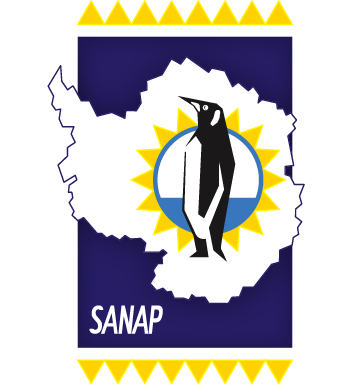



 Above (l-r) : Greg(middle) to leave for Bouvet; Greg on Marion Island; Greg on Bouvet Island
Above (l-r) : Greg(middle) to leave for Bouvet; Greg on Marion Island; Greg on Bouvet Island  I took up my current employment in 2006 as marine mammal biologist at the
I took up my current employment in 2006 as marine mammal biologist at the 

 When I was very young I was keen to become a game ranger. While in high school this had morphed into being a zoologist. And this is the career that I was lucky enough to follow. It has given me wonderful opportunities and allowed me to do some fascinating things. I had always wanted to work in wild places and so arriving on Marion Island for the first time was like arriving in paradise. Before the end of my first year, I new that I had to return. I loved every moment on this rough place. Not only was it beautiful and challenging, but it also allowed one the opportunity to observe animals fairly closely and wonder about their way of life and behaviour. How did these very distant relatives of our survive in an environment so hostile to us? Thus it was also intellectually stimulating. And I have loved to return to wild places and ask questions about the natural work ever since.
When I was very young I was keen to become a game ranger. While in high school this had morphed into being a zoologist. And this is the career that I was lucky enough to follow. It has given me wonderful opportunities and allowed me to do some fascinating things. I had always wanted to work in wild places and so arriving on Marion Island for the first time was like arriving in paradise. Before the end of my first year, I new that I had to return. I loved every moment on this rough place. Not only was it beautiful and challenging, but it also allowed one the opportunity to observe animals fairly closely and wonder about their way of life and behaviour. How did these very distant relatives of our survive in an environment so hostile to us? Thus it was also intellectually stimulating. And I have loved to return to wild places and ask questions about the natural work ever since.
 If you want to become a scientist, do what you love. It is a tough career that requires
If you want to become a scientist, do what you love. It is a tough career that requires

 Johannes Jacobus Viljoen grew up in the small town of Wolseley in the upper Breede River Valley and started his tertiary education at Stellenbosch University after graduating high school in Ceres. He completed a BSc in Earth Science in 2015 and became the first member in his family with a university qualification. In 2016, he completed a BSc (Hons) Earth Science degree in Environmental Geochemistry where he gained a keen interest in marine biogeochemistry and research. He continued his studies as a graduate research student on phytoplankton distribution in the Southern Ocean at Stellenbosch University within the
Johannes Jacobus Viljoen grew up in the small town of Wolseley in the upper Breede River Valley and started his tertiary education at Stellenbosch University after graduating high school in Ceres. He completed a BSc in Earth Science in 2015 and became the first member in his family with a university qualification. In 2016, he completed a BSc (Hons) Earth Science degree in Environmental Geochemistry where he gained a keen interest in marine biogeochemistry and research. He continued his studies as a graduate research student on phytoplankton distribution in the Southern Ocean at Stellenbosch University within the 
 Johan is currently a
Johan is currently a  He attended his first SANAP symposium in 2016. He attended the Polar 2018 conference in Davos, Switzerland in 2018 where he presented an oral presentation on his research. He later joined the South African branch of the Association for Polar Early Career Scientists (APECS-SA) as a committee member during his second SANAP symposium in 2018. He currently serves on the APECS-SA national committee as one of the co-chairs. From 2018 – 2019, he also served as the postgraduate representative of the Department of Earth Sciences at SU on the postgraduate committee of the Faculty of Science.
He attended his first SANAP symposium in 2016. He attended the Polar 2018 conference in Davos, Switzerland in 2018 where he presented an oral presentation on his research. He later joined the South African branch of the Association for Polar Early Career Scientists (APECS-SA) as a committee member during his second SANAP symposium in 2018. He currently serves on the APECS-SA national committee as one of the co-chairs. From 2018 – 2019, he also served as the postgraduate representative of the Department of Earth Sciences at SU on the postgraduate committee of the Faculty of Science.
 Johan is driven to learn more about marine science and sharing his research and experiences with others. To date, he has published two scientific articles from his MSc research and aims to follow an academic career. In August 2017, he was awarded the opportunity by the
Johan is driven to learn more about marine science and sharing his research and experiences with others. To date, he has published two scientific articles from his MSc research and aims to follow an academic career. In August 2017, he was awarded the opportunity by the  In his free time, he enjoys spending time with his family and friends, watching documentaries and movies based on true events, reading, hiking and travelling. He considers himself to be a bit of a coffee connoisseur, a budding gardener and an experimental cook.
In his free time, he enjoys spending time with his family and friends, watching documentaries and movies based on true events, reading, hiking and travelling. He considers himself to be a bit of a coffee connoisseur, a budding gardener and an experimental cook.
 freelance and volunteer work for SANAP. Alexander Oelofse is becoming a well-known name within the SANAP community. His
freelance and volunteer work for SANAP. Alexander Oelofse is becoming a well-known name within the SANAP community. His  realized that as freelancer he can be of great service to the community and to
realized that as freelancer he can be of great service to the community and to  that I would want to be in, or surrounded, by the ocean as much as possible. I wanted to study marine biology for a long time. Until job shadowing a marine biologist and realising much of the work would be lab-based. I couldn’t imagine that for myself. I then decided to pursue my other passion; photography. Being a member of the photographic society in high school sparked my interest. This led to me studying
that I would want to be in, or surrounded, by the ocean as much as possible. I wanted to study marine biology for a long time. Until job shadowing a marine biologist and realising much of the work would be lab-based. I couldn’t imagine that for myself. I then decided to pursue my other passion; photography. Being a member of the photographic society in high school sparked my interest. This led to me studying  While at University I already started trying to find a way onboard the S.A. Agulhas II. I had to see this stark, extreme and yet breathtakingly beautiful landscape for myself. It took a few years of applying, without succeeding, until I could get onboard the SEAmester III as a lecturer after my studies. Onboard students from various universities around South Africa get the opportunity to experience oceanographic research at its best, out in the field, onboard the
While at University I already started trying to find a way onboard the S.A. Agulhas II. I had to see this stark, extreme and yet breathtakingly beautiful landscape for myself. It took a few years of applying, without succeeding, until I could get onboard the SEAmester III as a lecturer after my studies. Onboard students from various universities around South Africa get the opportunity to experience oceanographic research at its best, out in the field, onboard the  He departed on the first leg of
He departed on the first leg of  “Seeing the ice shelf for the first time left me speechless. I became quite emotional, realising my dream had come true”.
“Seeing the ice shelf for the first time left me speechless. I became quite emotional, realising my dream had come true”.  “One of my highlights was getting to sit on the back of a snowmobile and traverse the snowy landscapes. Being the passenger allowed me to, despite the icy breeze, absorb the sublime landscapes that we passed through. This image was captured at 02:00 am. You could see the sun dip ever so slightly but never setting. I could get used to that. It made life seem endless, like there was no rush”
“One of my highlights was getting to sit on the back of a snowmobile and traverse the snowy landscapes. Being the passenger allowed me to, despite the icy breeze, absorb the sublime landscapes that we passed through. This image was captured at 02:00 am. You could see the sun dip ever so slightly but never setting. I could get used to that. It made life seem endless, like there was no rush”

 What ship will SEAmester take place on?
What ship will SEAmester take place on? 




